Startup Story: ResQuant X NATO DIANA Estonian Accelerator
ResQuant develops quantum-resistant security solutions for IoT devices* – protecting them not only from today’s cyber threats but also those posed by tomorrow’s quantum computers. At the heart of the offering is a silicon-based Root-of-Trust chip that safeguards data and communications at the hardware level. Aligned with the post-quantum cryptographic (PQC) standards defined by NIST and endorsed by the European Union, ResQuant’s technology is designed to comply with upcoming 2030 requirements for critical systems.
The company’s origins are deeply rooted in national defence and global telecom. Michał Andrzejczak, ResQuant’s CTO and Founder, is a seasoned cybersecurity expert with 14 years of service in Poland’s cyber defence forces. His PhD research at the Polish Military Academy laid the foundation for the company’s technology, although much of his past work remains classified.
Joining him is Sven Zagala, CEO and Co-Founder, who brings a strong commercial edge. A former executive at Motorola and Harris Stratex, Sven managed operations across 22 Central and Eastern European countries. After successfully running his own company and spending five years as a startup mentor and angel investor, he joined ResQuant in 2023 to drive it from deep-tech vision to market-ready product.
How was the startup idea born?
The idea for ResQuant emerged during the COVID-19 pandemic, when Michał began exploring ways to commercialise the findings from his doctoral research. He bootstrapped the initial development between 2020 and 2021. The startup gained traction after receiving its first pre-seed investment in 2021, transitioning from a research project into a viable company.
What has been your biggest challenge/obstacle/largest win so far?
The company faced a major hurdle in 2023 when the initial CEO struggled to scale with the startup, pushing ResQuant toward collapse during what is often called the “valley of death” stage. This was overcome when Sven assumed the CEO role, successfully attracting funding and steering the company forward.
That pivot proved successful. By late 2024, ResQuant had secured a €185,000 contract with the European Space Agency — a major validation of its technology. The momentum continued when the startup was selected for the NATO DIANA accelerator in December 2024, reinforcing its position as a key player in the emerging field of dual-use, quantum-safe security solutions.
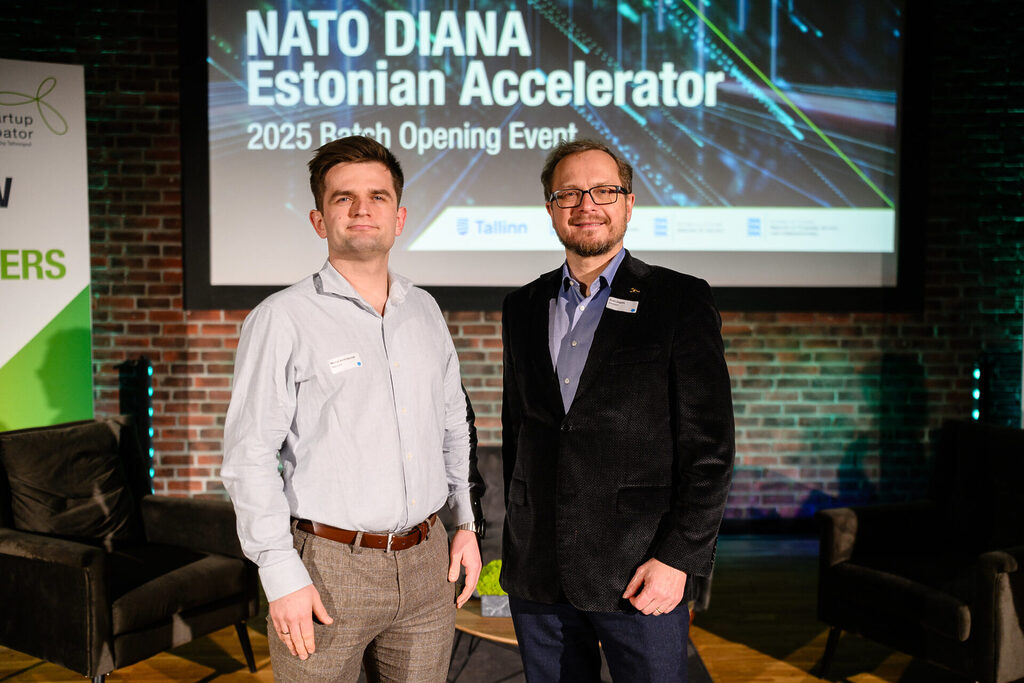
What differentiates your company from the competition?
What sets ResQuant apart from the competition is its strategic approach to building accessible, trustworthy, and scalable solutions. With a strong dual-use focus, the company designs products that serve both civilian and military applications, addressing critical infrastructure needs across sectors.
Why did you apply to the NATO DIANA accelerator?
Given our strategic emphasis on dual-use technology, NATO DIANA represents a perfect alignment with our mission. Participation in the accelerator is a key part of our growth strategy and validation in the defence technology ecosystem.
Where do you see your company in 12 months? How about in 5 years?
In 1 year: Our goal is to produce silicon-proven, certified chips embedded with our IP, ready to be deployed in multiple dual-use proof-of-concept scenarios.
In 5 years: We envision billions of IoT devices incorporating our chips, forming a global standard for quantum-safe security. These devices will not only be protected against quantum threats but will also generate new revenue streams through secure updates and services.
Who will be the next unicorn in Estonia or in your home country of Poland?
The future Cybernetica and Resquant PQC Joint Venture, of course!
The Estonian accelerator is implemented by Tehnopol Startup Incubator together with Sparkup Tartu Science Park.
* An IoT device is a smart object that connects to the internet and shares data, like a smart watch or home thermostat.
Estonian startup Wayren raises €7.9 million to develop an innovative communications system for the soldier of the future
Estonian startup Wayren, founded by former cyber defence experts, has signed a €7.9 million strategic investment agreement with EFA GROUP, one of the world’s leading defence industry conglomerates. The goal is to jointly develop next-generation high-tech digital battlefield systems that connect soldiers, drones, vehicles, and weapons into an integrated situational awareness solution. Wayren has previously received funding from Prototron, graduated from the Tehnopol Startup Incubator, and is currently part of the NATO DIANA accelerator programme in Estonia.
“Today’s battlefield is a complex and dynamic environment where singular equipment and training alone are no longer enough. To gain a decisive edge, digitalisation is essential – enabling real-time data collection, processing, and sharing, which significantly accelerates decision-making. Most current tactical communication systems struggle in extreme conditions as they’re not reliable enough for last-mile environments. Our systems are built to function even when everything else fails,” said Henry Härm, CEO and co-founder of Wayren.
Wayren’s proprietary Singularity communication platform enables resilient communication between soldiers, command units, and various platforms under demanding battlefield conditions. The patented system establishes a reliable hybrid mesh network to connect units, vehicles, and command posts, synchronising data simultaneously via any available civil or military communication technologies – such as mobile, satellite, or radio networks.
A central role in this strategic partnership between the two defence innovators is played by SCYTALYS, a member of the EFA GROUP. SCYTALYS develops advanced, modular, and interoperable battle management systems designed to meet the complex multi-domain challenges of modern armed forces.
According to George Menexis, CEO of SCYTALYS, this collaboration sets a new benchmark for fully interoperable and flexible multi-domain operational capabilities.
“Our proven Mission Information and Management System (MIMS), combined with Wayren’s resilient frontline communication innovation, delivers next-generation connectivity and coordination capabilities for today’s network-centric operations. The Common Operational Picture (COP) remains continuously synchronised across all connected forces, built on a robust communications architecture that maintains operational continuity, even in degraded environments. By integrating THEON International’s cutting-edge night vision and augmented reality technologies, we ensure comprehensive situational awareness and tactical superiority for deployed units,” Menexis explained.
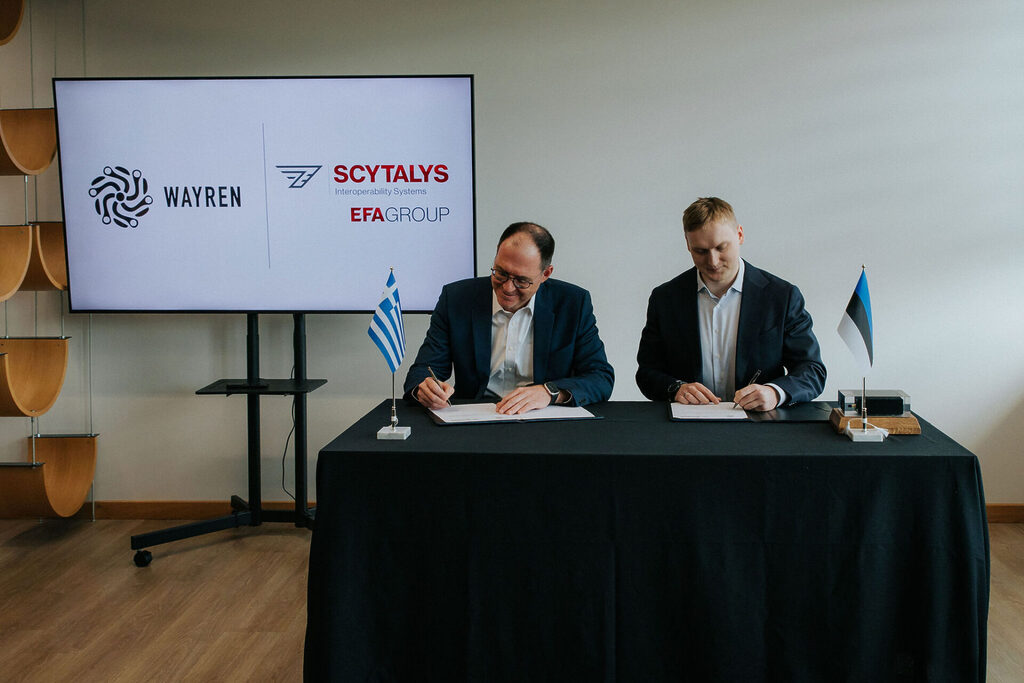
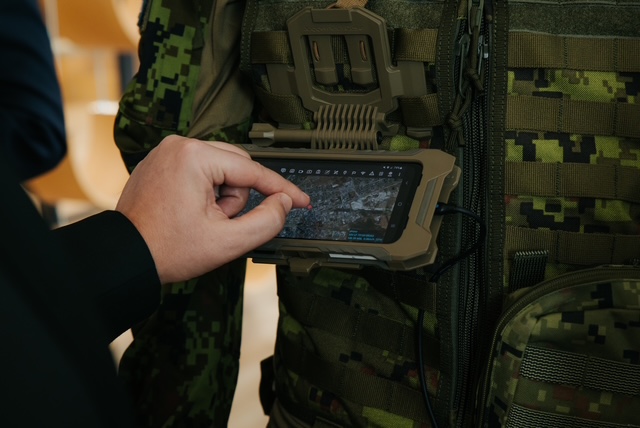
Wayren’s platform forms the backbone of the modern battlefield – from sensors to AI-powered analytics and situational awareness systems. The solution ensures that critical data reaches its destination even in heavily disrupted, low-bandwidth, or unstable network environments.
The system has already been delivered as a pilot project to the Estonian Defence League and is currently being actively tested by both the Estonian Defence Forces and the Ukrainian Armed Forces.
“Close cooperation with the defence forces has allowed us to significantly improve the usability and reliability of the system in real combat conditions. Their valuable feedback, combined with our extensive testing, gives us confidence that the product is ready for full-scale deployment and government procurement. Estonia and Ukraine are our first key customers,” explained Henry Härm.
In addition to its military applications, Wayren sees considerable potential for its Singularity communication platform in civilian sectors. In the future, this could even become the company’s main business focus. The technology can enhance operational efficiency and situational awareness in mission-critical fields such as mining, law enforcement, rescue services, industry, and more.
Wayren was founded five years ago by three former cyber defence personnel – Henry Härm, Oliver Tiit, and Tarmo Aia. Full-scale development began in 2022 when the company received development support from the Estonian Ministry of Defence. Funding has also been provided by the European Defence Fund. In 2023, the company raised €725,000 from private investors to support the development and testing of the pilot project. The investment round was led by BSV Ventures, with participation from DEPO Ventures and several angel investors, including Taavi Veskimägi, Chairman of the Supervisory Board of the Estonian Defence Industry Association. Wayren was also recently selected for the NATO DIANA accelerator programme in Estonia.
EFA GROUP is a global aerospace, security, defence, and industrial cooperation group headquartered in Athens. SCYTALYS, founded in Greece in 1993 and part of EFA GROUP, specialises in the development of mission-critical software and systems integration. Its key partner is THEON International, one of the world’s leading developers and manufacturers of night vision, thermal imaging, and augmented reality systems. Together, they are pioneering solutions for the “soldier of the future.”
Dual-use, real impact: What happened at DIANA Estonia’s latest onsite
The fourth onsite of the NATO DIANA Estonian Accelerator wrapped up last week, bringing together startups from across the alliance as this time, we didn’t go at it alone. The April session was a collaboration between the NATO DIANA Danish and Estonian accelerators, offering a stronger collaborative effort and real-world engagement between the two.
This edition was brought together our lucky seven – ResQuant, Telearmy, Wayren, IS-Wireless, Scaleout, Factiverse and Microamp – as well as six companies from the DIANA accelerator site in Denmark, hosted at the BioInnovation Institute in Copenhagen: 52North (creators of Neutrocheck®), Cogitat, Sensible Biotechnologies, Alea Quantum Technologies, CUbIQ Technologies and Quantropi Inc. While associated with their respective accelerator sites, the participating companies represent a diverse range of countries and specialisations.
The week kicked off at the e-Estonia Briefing Centre in Tallinn with a no-nonsense panel on what not to do as a dual-use startup. Glen Kelp from GaltTec and Silver Lodi from Spaceit shared honest reflections from their journeys, sparking a lively and practical discussion that set the tone for the days ahead.
After morning matchmaking and networking, the group travelled to Tartu to meet with the Centre of War and Disaster Medicine at the Estonian Military Academy – a key stakeholder in testing and scaling defence-relevant technologies. This mix of Tallinn’s tech-forward mindset and Tartu’s defence expertise reflects the balanced approach of the Estonian accelerator, which is delivered by Tehnopol Startup Incubator in partnership with Sparkup Tartu Science Park.
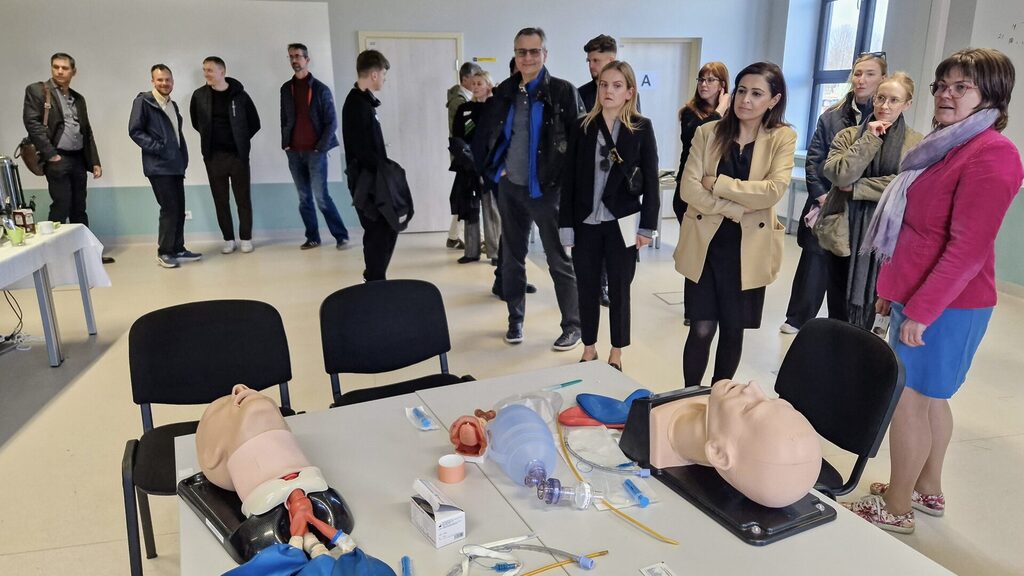
Days two and three were all about skill-building, with teams diving into workshops designed to prepare them for high-stakes moments – from pitching to NATO end-users to navigating defence-specific communication and go-to-market strategies. These sessions weren’t just about theory, they were about preparing for moments that matter, like pitching to NATO end-users or adapting commercial tech to serve military and security contexts.
Kudos to Nicholas Hawtin, Lisbeth Holdt Jørgensen, Rainer Saks, Raimond Kaljulaid, Katrin Kiviselg, Gleb Maltsev, and Raido Saremat for sharing your expertise and supporting the NATO DIANA teams on their journey!
One of the key highlights of the week was a visit to Tapa Army Base, where startups presented their solutions to representatives from the Estonian Defence Forces and NATO’s Enhanced Forward Presence (eFP). Following an operational briefing, the companies delivered concise three-minute pitches demonstrating how their technologies could support both national and allied defence efforts.
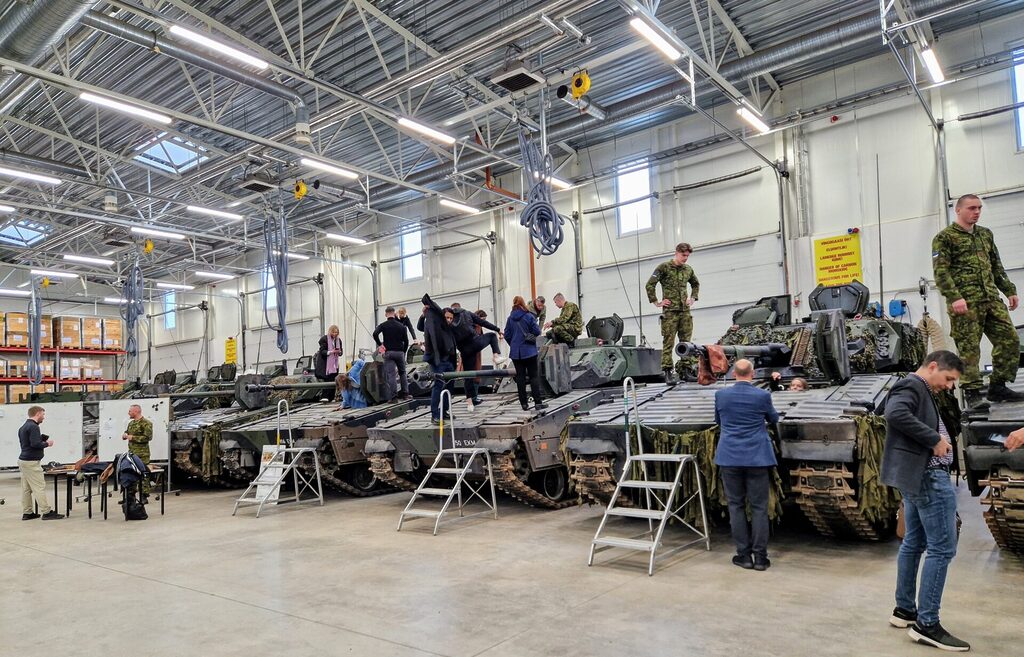
Adding to the international reach of the programme, we were pleased to welcome Loren Bailey, project lead at COVE, which hosts the Canadian DIANA accelerator focused on marine technology. Loren joined the onsite to foster stronger collaboration across the growing DIANA network.
This kind of cross-site exchange between teams affiliated with Estonia, Denmark and Canada – underscores the global nature of both innovation and security challenges. It also demonstrates our commitment to building a truly international ecosystem of problem-solvers, capable of responding to NATO’s most pressing capability needs.
As the teams returned to Tallinn to conclude the programme, one thing stood out: collaboration fuels progress. Whether refining a pitch, engaging with end-users, or navigating the complexities of dual-use markets, the momentum built during this onsite will continue to drive innovation forward.
Next up? The May onsite in Tallinn, including booths and pitches on the Latitude59 stage.
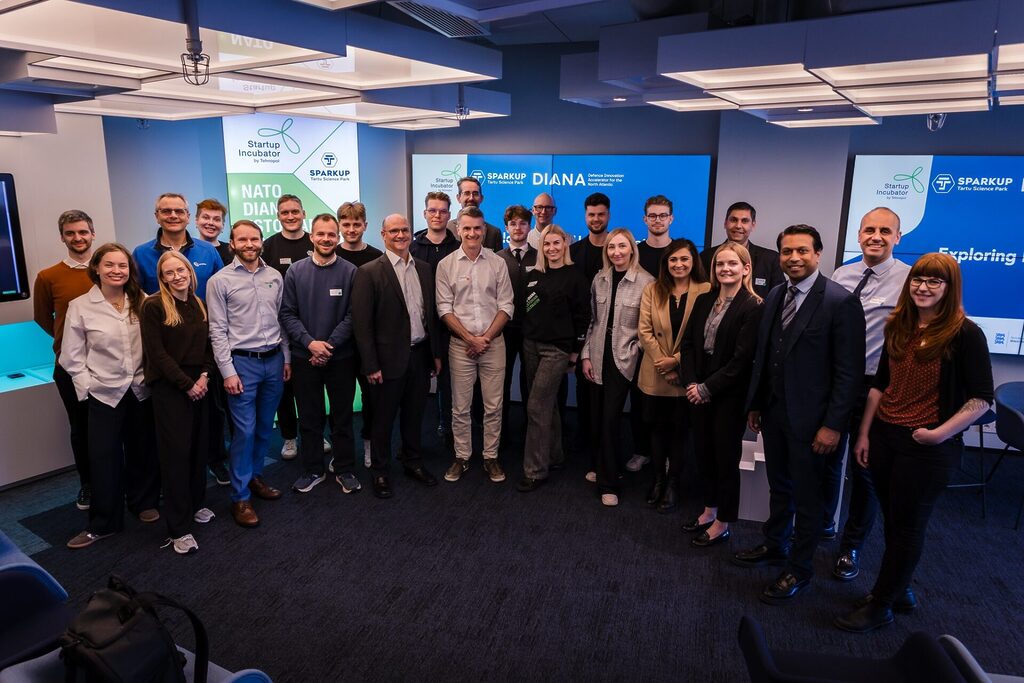
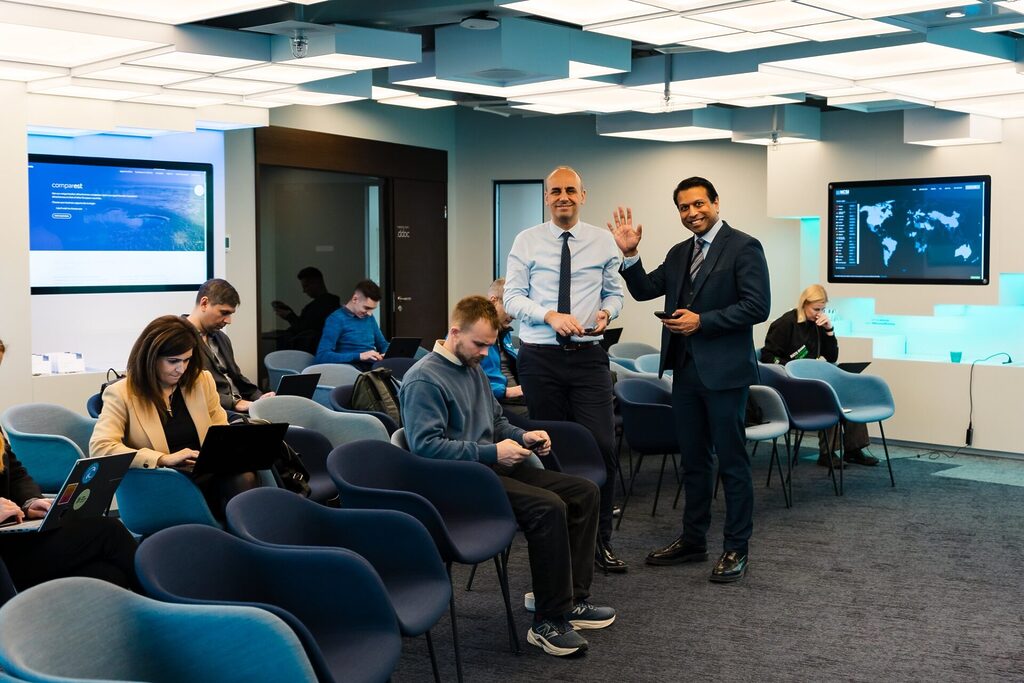
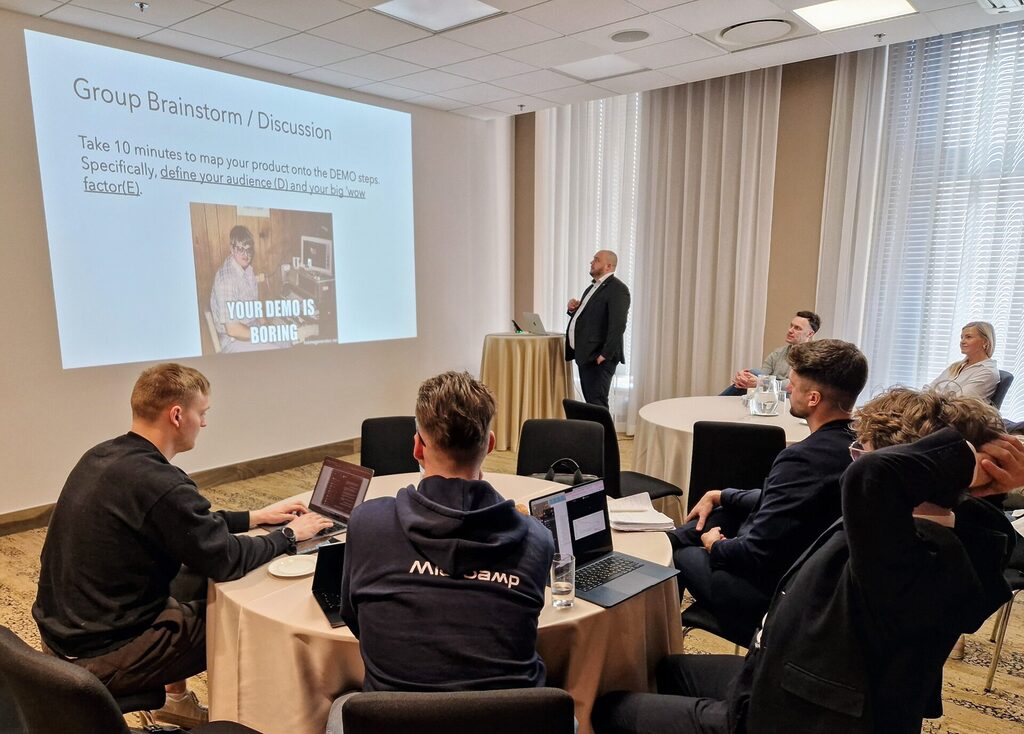
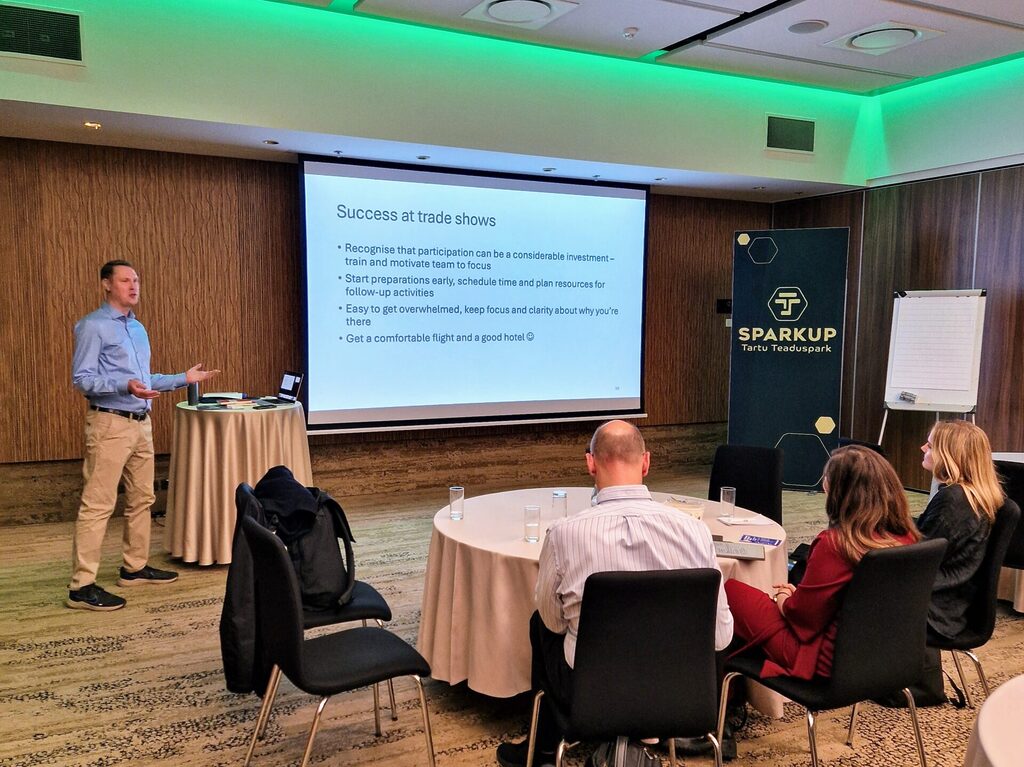
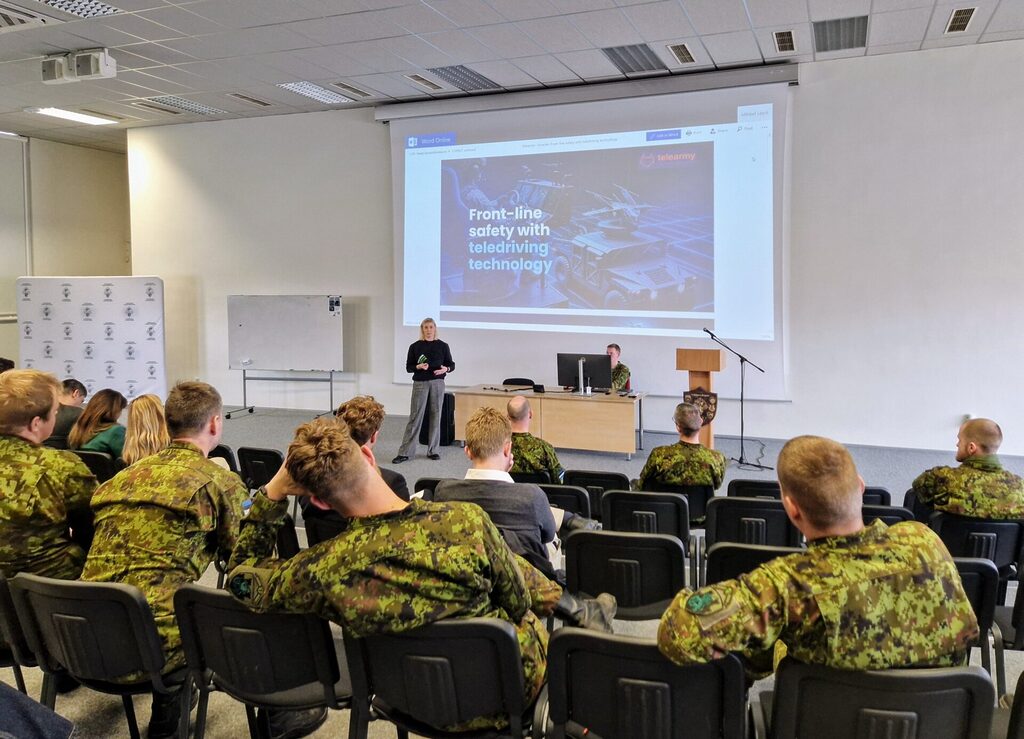
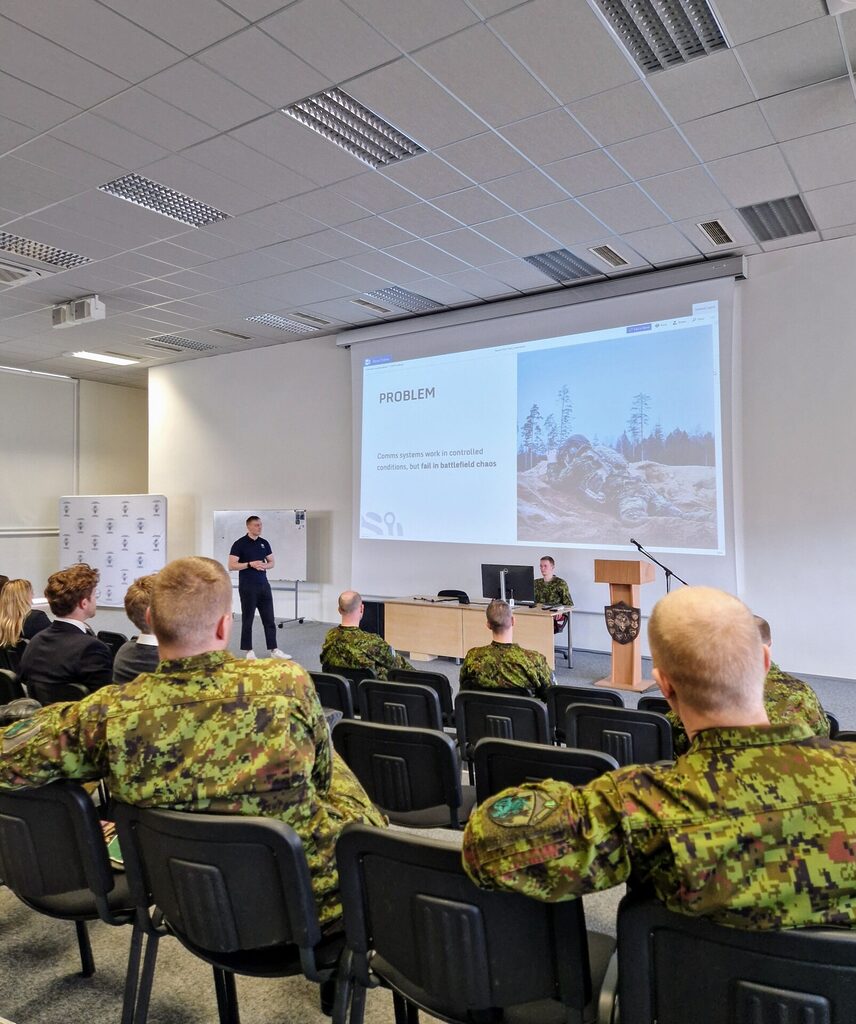
Startup Story: IS-Wireless X NATO DIANA Estonian Accelerator
IS-Wireless Liquid RAN (Radio Access Network) is a dual-use technology focused on rapid network restoration and the replication of damaged base stations anywhere. Liquid RAN allows the deployment of the cellular network on top of highly volatile computing infrastructure – a critical feature not yet achieved by contemporary RAN implementations.
To break it down further, IS-Wireless Liquid RAN is a technology that can be used both in everyday situations and in emergencies. It is called “Liquid” because it is highly flexible — if a base station is damaged, the network can quickly rebuild itself, restoring connectivity.
This is useful in crises (such as natural disasters or military situations), where restoring communications rapidly is critical. In normal times, it helps mobile operators build and run their mobile networks more efficiently with lower total cost of ownership (TCO), using less energy and saving money — especially when building a dense network.
Please briefly introduce some of the minds behind IS-Wireless.
The people leading IS-Wireless are CEO and founder Slawomir Pietrzyk, COO Kamil Pluskwa-Dąbrowski, and CTO Robert Cieloch.
Slawomir is an expert in wireless technologies and the author of the first book on Orthogonal Frequency Division Multiple Access (OFDMA), published in 2006. He holds a PhD from Delft University of Technology in the Netherlands.
Before joining IS-Wireless, Robert spent 18 years as a RAN expert at T-Mobile Poland S.A. Earlier in his career, he served as a Second Lieutenant (Platoon Commander) in the 11th Communications Regiment of the Polish Navy.
Kamil is an attorney-at-law (Warsaw Bar Association) whose areas of legal practice include telecommunications, e-commerce, trade, corporate law, intellectual property, among others. He previously served as CEO of the Polish Consumer Federation.
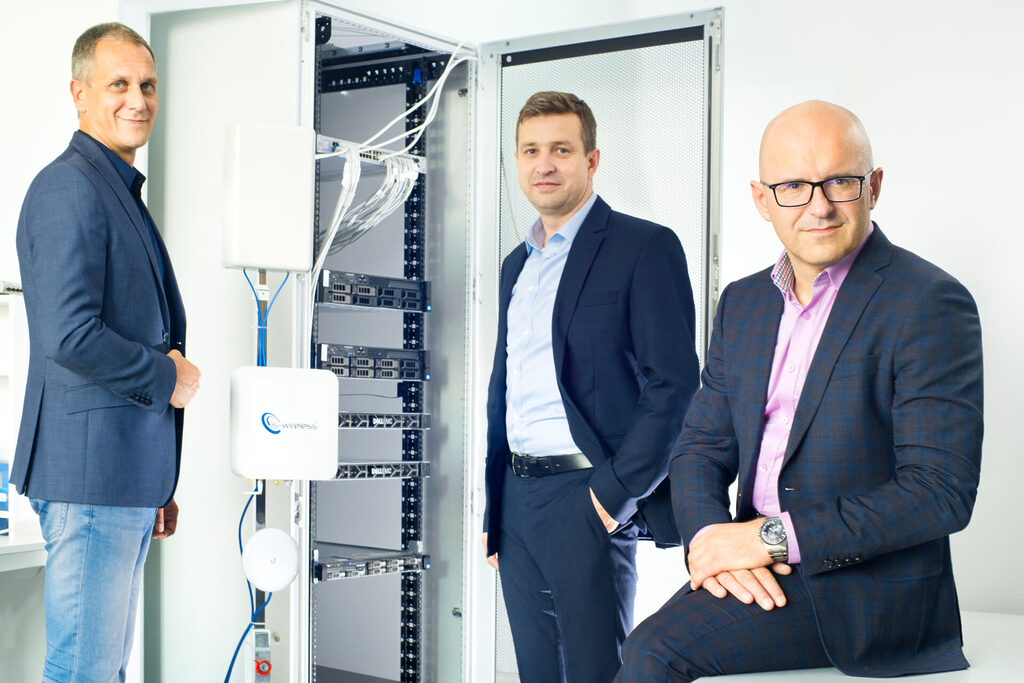
How was the startup idea born?
The company’s origins lie in training activities related to mobile communication technologies. IS-Wireless actively participated in the standardisation of LTE** and contributed directly to shaping the development of 4G. This hands-on experience gave us a clear view of the challenges and opportunities in wireless network implementation. Recognising 5G as the next major shift in mobile technology, IS-Wireless began working on its standardisation in parallel.
What have been your biggest challenges and obstacles so far?
The biggest challenge has been overcoming market resistance to Private 5G. Many customers still view Wi-Fi as sufficient and hesitate to adopt new technologies. Another major obstacle has been the slow uptake of open mobile networks by telecom providers, despite public support, which often results in longer project timelines. That said, change is happening, and awareness continues to grow.
What makes your technology a great dual-use solution?
As a dual-use technology, Liquid RAN can easily be applied to critical situations where such behaviour of RAN is vital: self-healing, rapid network restoration, efficient resource utilisation to minimise costs, and enhanced protection against cyberattacks and other threats. A cellular network is of utmost importance in critical situations and is therefore highly exposed to potential enemy attacks or natural disasters. This can result in network downtime and a lack of basic connectivity services.
In non-crisis situations, Liquid RAN enables significant savings in network deployment, operations, and energy consumption costs. The solution can be used, for example, by mobile network operators massively densifying their networks.
What differentiates IS-Wireless from the competition?
Our Liquid RAN technology – an advanced, open, and disaggregated radio network – is designed for extremely efficient use of communication resources. This results in lower network deployment costs and reduced energy consumption. Compared to competitors, our solution is significantly more disaggregated and distinctly non-monolithic.
Why did you apply to the NATO DIANA accelerator?
We applied to the NATO DIANA accelerator because we believe our technology, designed for mission-critical and disaster-response scenarios, aligns well with NATO’s security objectives. As a company from a NATO country, we also wanted to contribute to collective security and gain greater visibility within the alliance.
Where do you see your company in 12 months’ time? And in five years?
In 12 months, we see IS-Wireless having a strong market presence with multiple successful installations. In five years, we aim to scale globally, open offices in key markets, and become a leading provider of Private 5G solutions.
Who will be the next unicorn in Poland?
We certainly aspire to become one!
The Estonian accelerator is delivered by the Tehnopol Startup Incubator in partnership with Sparkup Tartu Science Park.
*OFDMA is a wireless communication technology that splits a signal into multiple smaller sub-signals, allowing several users to send and receive data at the same time on the same channel, which makes the network faster and more efficient.
**LTE (Long Term Evolution) is a 4G mobile network technology that enables fast and reliable wireless data transmission.
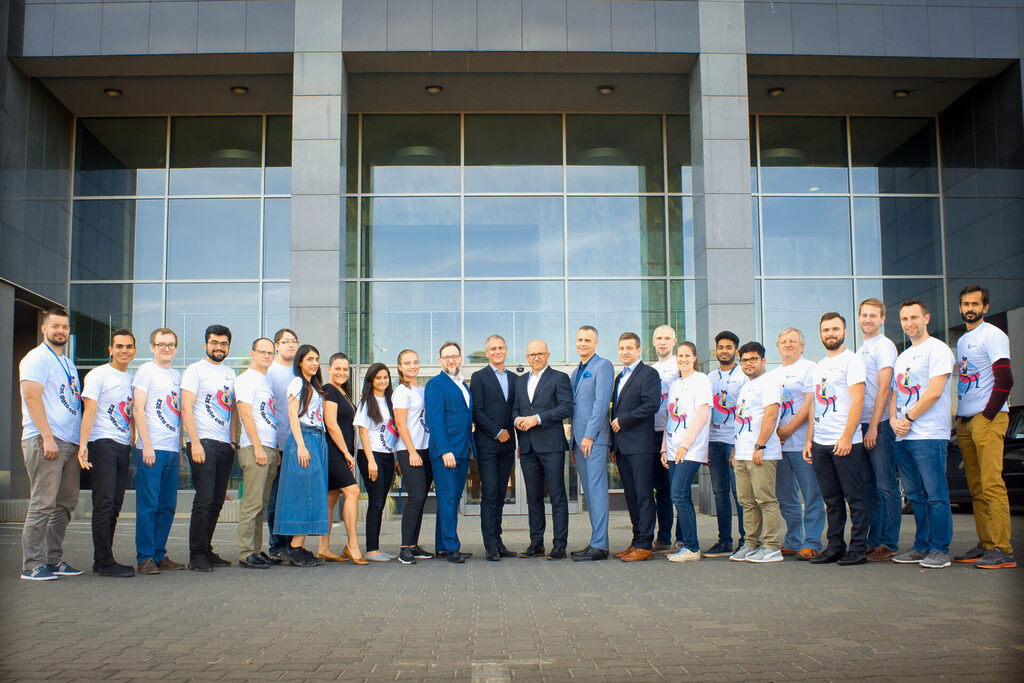
Ten startups begin developing their ideas in the defence technology pre-accelerator
On Friday, April 4, the companies selected for the first round of the defence technology pre-accelerator were announced in Tapa. The pre-accelerator is aimed at deep-tech startups operating in the defence sector. The programme is jointly implemented by the Tehnopol Startup Incubator and the Sparkup Tartu Science Park.
The pre-accelerator supports startups whose ideas have been validated and who have an initial prototype, helping them further develop their solutions and test them in real-life environments. Participants benefit from training, mentoring, and networking opportunities, and are also prepared for future rounds of the NATO DIANA accelerator and the European Defence Fund.
The programme is jointly run by the Tehnopol Startup Incubator and the Sparkup Tartu Science Park – five companies are developing their solutions in Tallinn, and five in Tartu.
“Working with the NATO DIANA accelerator teams, we see that Estonian defence sector companies are innovative, and encouraging growth in this field is extremely important. Our goal is to support the potential of these companies and help them prepare for their next key steps. Technological solutions are in high demand in the defence sector, as rapid advancements in technology offer new opportunities to improve both responsiveness and preventive measures,” said Anne-Liisa Elbrecht, Head of the Tehnopol Startup Incubator.
“It is great to see so many smart teams in Estonia who want to contribute to national security – from demining robots to digital mapping solutions. Within the programme, we aim to explore how these solutions can best be integrated into the defence sector,” said Pirko Konsa, Member of the Management Board at Sparkup Tartu Science Park.
The following startups were selected for the pre-accelerator:
- Thistle OÜ develops and manufactures mobile anti-drone systems.
- Metamobilise offers a solution that significantly accelerates the development of shooting skills with small arms and makes training more engaging, realistic, and insightful.
- UnMarSys is developing unmanned surface vehicles (USVs) for maritime surveillance, monitoring, and defence.
- Asvel is working on a self-driving robot capable of automatically controlling an endoscopic camera during minimally invasive surgeries.
- Ratel Robotics is developing a modular unmanned ground vehicle (UGV) designed for defence and security challenges, focusing on autonomy, resilience, and rapid task-specific adaptability.
- Max Joule is creating next-generation battery systems based on advanced battery chemistry for specialised applications.
- Taara Robotics specialises in autonomous collaborative robots and environmental mapping.
- Falconers is developing next-generation remote sensing AI and hardware for Earth digitisation.
- Milmech Systems is creating a fast, cost-effective, remotely operated demining device to help save lives in conflict zones.
- C2Grid provides AI-based instant 3D situational awareness solutions generated from video footage.
The pre-accelerator programme offers participants a €5,000 grant, an in-depth training programme led by experienced experts, and the opportunity to collaborate with an extensive mentor network. The programme culminates in a demo day, where the progress and international scaling potential of the projects will be evaluated.
The pre-accelerator is implemented by the Tehnopol Startup Incubator and the Sparkup Tartu Science Park. The programme is funded by the Ministry of Defence and supported by the Ministry of Economic Affairs and Communications.
Startup Story: Microamp x NATO DIANA Estonian Accelerator
Microamp provides high-performance mmWave* connectivity for robust, secure, and redundant streaming of massive volumes of data in real time. Their solution enables the rapid deployment of a flexible, uplink-heavy 5G mmWave private network—ideal for applications requiring the uplink of large data volumes, such as live video analytics from multiple mobile, high-resolution wireless cameras.
The minds behind Microamp are CEO Dawid Kuchta and CTO Marcin Górlaczyk. Dawid brings 10 years of experience across commercial and military entities, having participated in R&D projects focused on the development of RF systems. Marcin has another 10 years of experience as one of Poland’s leading designers of base station amplifiers for mobile networks. He has worked in both Poland and the USA, including on military R&D projects such as “Wisła”.
- How was the startup idea born?
Marcin and I (Dawid) met at the Warsaw University of Technology over 15 years ago and have been best friends ever since. In 2020, we defended our PhDs on 5G and military power amplifiers, following years of research at top institutions in Singapore, the USA, and Poland. With deep expertise and a shared passion for innovation, we decided it was time to make a real impact. That’s how Microamp was born—a company set to shake up the telecom market by pushing the boundaries of wireless technology and delivering next-generation network solutions.
- What has been your biggest challenge/obstacle/largest win so far?
Biggest challenge – Finding our first paying industrial customer.
Obstacle – The telecom market is relatively closed, which makes global scaling more difficult.
Largest win – Securing a proof of concept (PoC) with one of the world’s largest telecom operators.
- What differentiates your company from the competition?
What differentiates us from the competition is our superior network performance, leveraging the mmWave spectrum to deliver multi-gigabit throughput and near-zero latency—perfect for streaming massive volumes of data in real time.
Our solution is end-to-end, highly portable, and can be deployed within hours, making it ideal for emergency communication.
There is a market gap for a flexible, EU-based provider offering end-to-end mmWave private networks, not only for large enterprises but also for mid-tier companies.
- Why did you apply to the NATO DIANA accelerator?
We applied to the NATO DIANA accelerator to gain support in developing our 5G mmWave technology and to connect with industry experts. The programme offers a valuable opportunity to test and scale our solution in a structured environment.
- Where do you see your company in 12 months? How about in 5 years?
The NATO DIANA accelerator provides an ideal framework for testing and scaling our solution. We believe DIANA’s support will accelerate our growth and help enhance defence capabilities through advanced wireless systems.
- Who will be the next unicorn in Estonia or in your home country of Poland?
Well, we’re fairly confident that Microamp will be the next unicorn in Poland! With our innovative 5G mmWave tech, we’re definitely on the right track—just wait and see! 😉
- Which book would you recommend to other startup founders?
Zero to One by Peter Thiel is a must-read for any startup founder. It’s about creating truly innovative products and building businesses that go from “zero to one”—transforming an idea into something groundbreaking.
The Estonian accelerator is implemented by Tehnopol Startup Incubator together with Sparkup Tartu Science Park.
* mmWave refers to a high-frequency band of the electromagnetic spectrum (typically 24–100 GHz) that enables ultra-fast wireless communication over short distances.
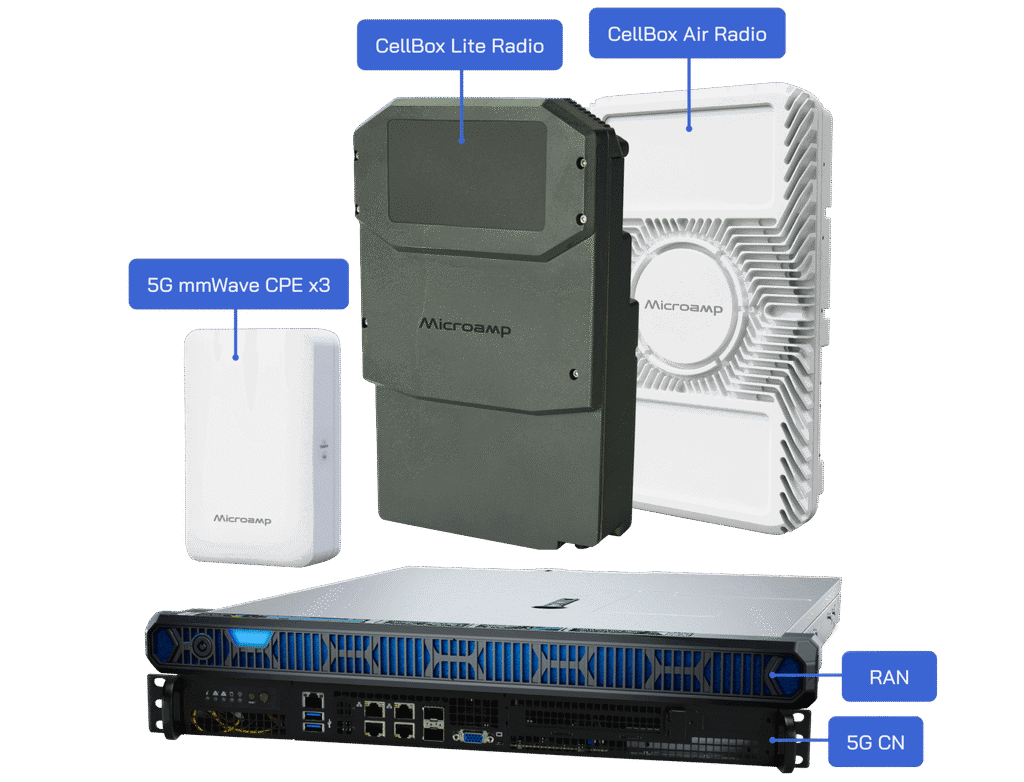
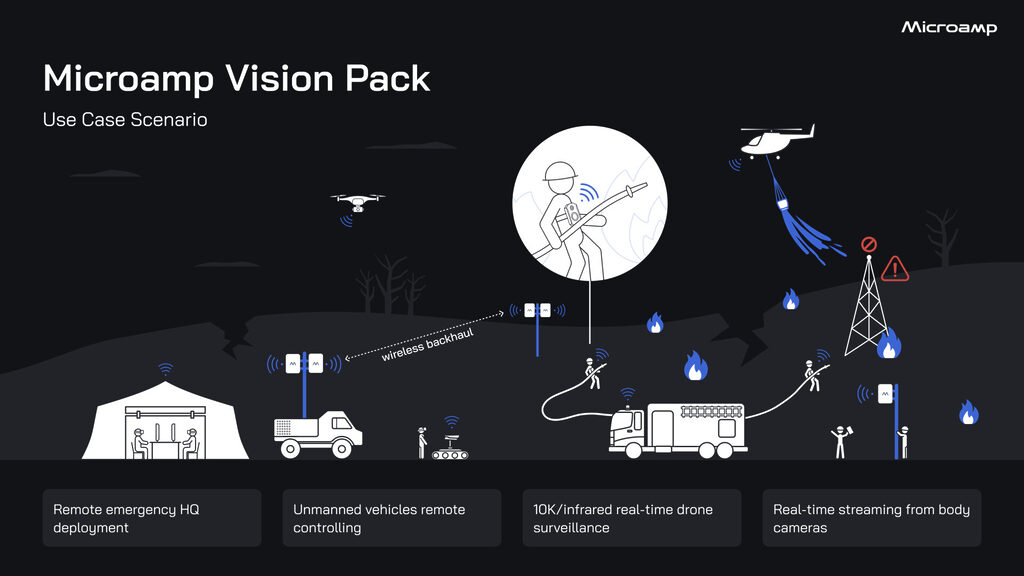
Startup Story: Telearmy x NATO DIANA Estonian Accelerator
Telearmy develops teledriving technology that enables existing vehicles to be quickly and cost-effectively converted into remotely controlled ones, increasing operational flexibility and tactical efficiency.
The minds behind the startup are Enn Laansoo, Jr. and Priit Haljak. Priit, a seasoned technology lead with an engineering background, has guided the development of a road-legal teledriven vehicle from scratch. With hands-on experience leading engineering teams and delivering complex technical systems—including those tested in combat—he brings deep tech capability to the table. Enn, on the other hand, focuses on the business side of innovation. With a track record in launching an electric car-sharing company and developing a deep-tech-friendly industrial park, he’s driven by the challenge of turning advanced technology into scalable, real-world solutions. Together, they’ve built a system that combines technical excellence with market-ready agility, unlocking the full potential of teledriving.
1. How did you come up with the idea to create a startup?
We saw how teledriving technology improves vehicle efficiency, enabling optimized resource use and faster, safer operations. The same principles apply to military logistics and critical infrastructure management—remote operation minimizes losses, maximizes operational speed, and enables strategic control even in complex and high-risk environments.
2. What have been the biggest challenges/failures and the biggest wins so far?
The biggest challenge has been adapting the technology to combat conditions, including ensuring interference-resistant communications, rapid integration into various vehicle platforms, and operational reliability in hostile environments. Our biggest success is that our technology has already been tested in combat and has proven effective in Ukraine. This has given us real-world experience on how remotely controlled systems can help carry out dangerous tasks.
3. What sets your startup apart from competitors?
Telearmy’s key advantages are rapid deployment and strategic flexibility. We are not building an expensive and complex autonomous system from scratch; instead, we enable existing vehicles to be quickly converted to teledriving, leading to lower costs and faster adoption. Additionally, our technology is not just a theoretical concept—it is already in use and has been tested in challenging environments. In military operations, teledriving technology supports achieving control, rapid and cost-effective success, and weakening the enemy’s logistical capabilities, providing the ability to operate remotely and flexibly.
4. Why did you choose NATO DIANA accelerator?
The NATO DIANA accelerator offers a unique platform that connects startups with the defense industry, enabling the development of dual-use technologies. Participation in the program gives us access to extensive testing infrastructure, experts, and networks, accelerating the advancement of our technology and its international expansion.
5. Where do you see your startup in 1 year? And where in 5 years?
In one year, we see Telearmy expanding into new markets and integrating its technology into various vehicle platforms, thereby increasing the availability of our solutions in allied nations. In five years, we aim to be a leading provider of teledriving technology, offering a broad range of solutions for both military and civilian applications, contributing to a safer and more efficient future.
6. Who is the next (Estonian) unicorn?
Estonia’s startup ecosystem is full of talented companies with the potential to become the next unicorn. While it is difficult to predict a specific name, I believe that companies focusing on innovative technologies and offering globally scalable solutions are strong contenders.
7. Which books/podcasts/publications and influencers in your field do you follow and would recommend to other aspiring entrepreneurs?
We discussed this as a team and concluded that there are many role models, and everyone finds inspiration in their own way. But if we were to recommend something specific, it would be to take a moment and listen to music. The right rhythm and pauses are essential for making decisions and generating new ideas. Sometimes, the best solution comes when you slow the tempo down for a moment.
The Estonian accelerator is implemented by Tehnopol Startup Incubator together with Sparkup Tartu Science Park.
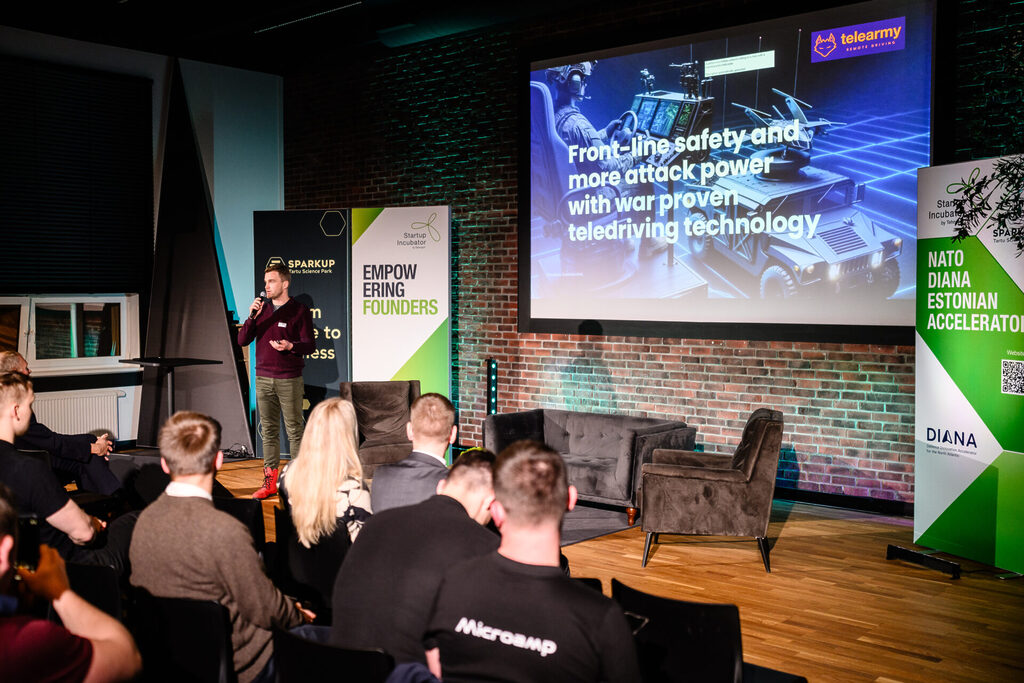
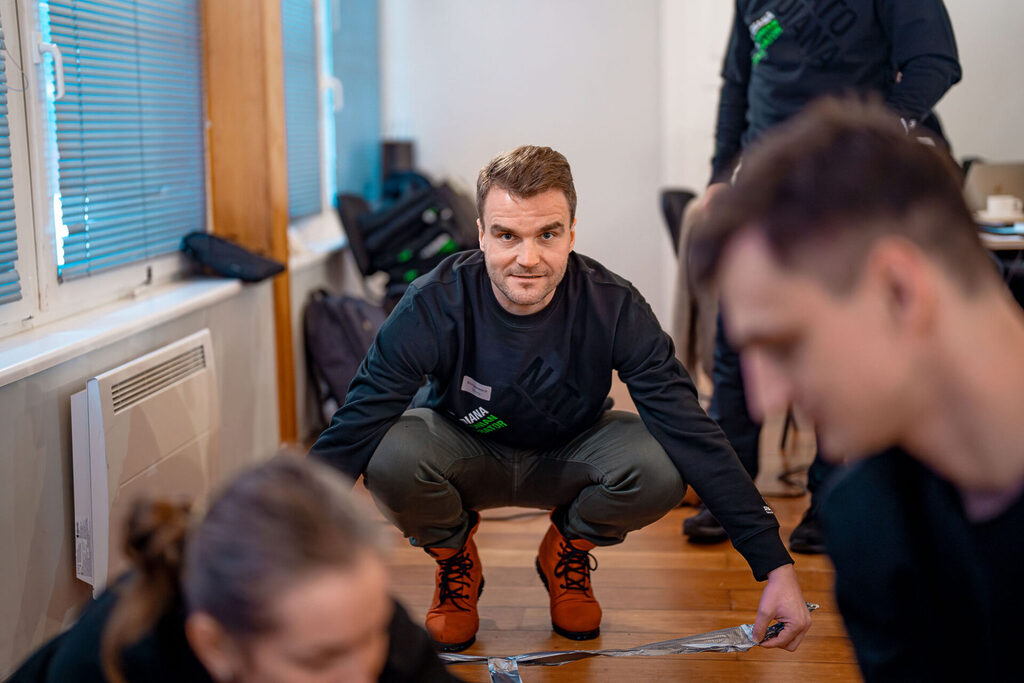
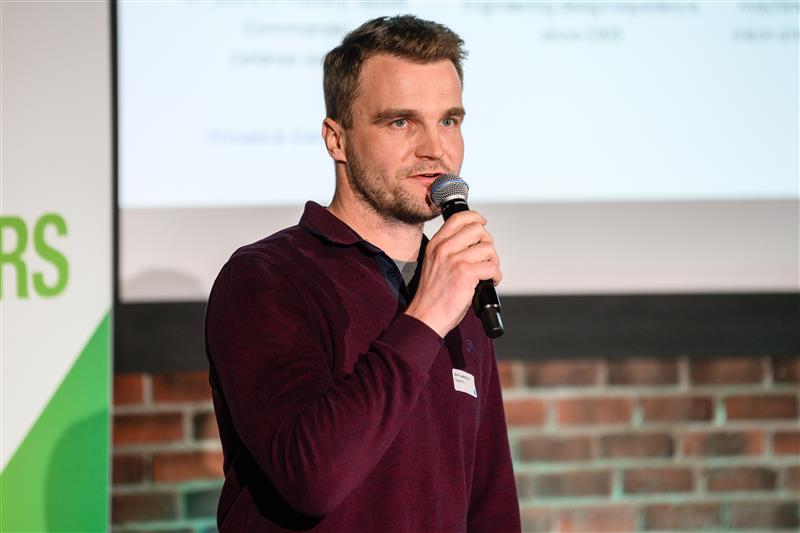
NATO DIANA Estonian Accelerator recap: Five days of innovation, investment & industry insights
Last week, Estonia welcomed back some of the brightest minds in dual-use technology for an action-packed onsite experience at the NATO DIANA Estonian Accelerator. Over five days, the 7 teams tackled masterclasses, investment workshops, pitch sessions, and test centre visits, forging connections and shaping their solutions. Here’s a look back.
Monday – A historic start by the sea
We gathered by the sea near the historic Patarei fortress. The crisp Estonian air (+5°C) set the tone for an evening of networking and casual re-introductions. Some explored the old prison, others opted for warm layers and seaside views.
Tuesday – Venture capital & pitch training
The NATO DIANA Estonian Accelerator officially began at Tehnopol with Sandra Golbreich and Erik Bhullar (BSV Ventures) leading masterclasses on raising venture capital and negotiation tactics. Meanwhile, teams stepped in front of the camera, pitching their solutions for the official video – an exercise in clarity and confidence. We can’t wait for you to see the end result.
Wednesday – Reverse pitches & defence sector insights
Superangel’s Nicholas Nelson and Jaan Kokk guided startups through financial planning and exit strategies. The afternoon featured a reverse pitch session, where investors and defence end-users outlined their needs. Representatives from 2C Ventures, NEDES, unmanned.vc, and SmartCap provided funding insights, while the Estonian Defence Forces, the Estonian Defence League, and Police and Border Guard Board shared real-world challenges.
Thursday – Pitches & defence market strategies
The morning brought the ‘Future of Defence Tech’ event at Tehnopol, where each startup delivered a three-minute pitch to an audience of Estonian dual-use tech peers. In the afternoon, Jaanus Tamm (DefsecIntel) led a session on dual-use negotiations, followed by an industry deep dive from Rene Ehasalu of the Estonian Defence and Aerospace Industry Association.
Friday – Test centres & real-world tech applications
The final day featured hands-on visits to some of Estonia’s top test centres. At TalTech’s 5G facility, teams explored the Faraday cage and drone testing capabilities. At CR14, they delved into NATO-grade cybersecurity exercises and resilience testing. The tour ended at the Estonian Academy of Security Sciences, where robotic systems and remote sensing technology were in focus.
By late afternoon, it was time to say goodbye – exhausted but inspired, with fresh insights and new strategic connections.
Final thoughts
The NATO DIANA Estonian Accelerator onsite week wasn’t just about listening to experts—it was about getting hands-on experience with real challenges. Whether it was refining pitches, meeting investors, or impressing defence end-users, every moment was a chance to adapt and improve. Startups learned that venture capital isn’t just about numbers on a slide deck, but about negotiation, relationship-building, and proving real-world impact. The test centre visits reinforced the need to validate tech in real-world conditions before deployment.
As these startups move forward, the real challenge begins – turning all these insights into action and proving that their solutions can stand up to the demands of the dual-use sector. One thing is certain: the connections and lessons from this week won’t just stay in Tallinn—they’ll shape the future of dual-use tech far beyond Estonia.
Next up? A week filled with communication-topics in Tartu in April.
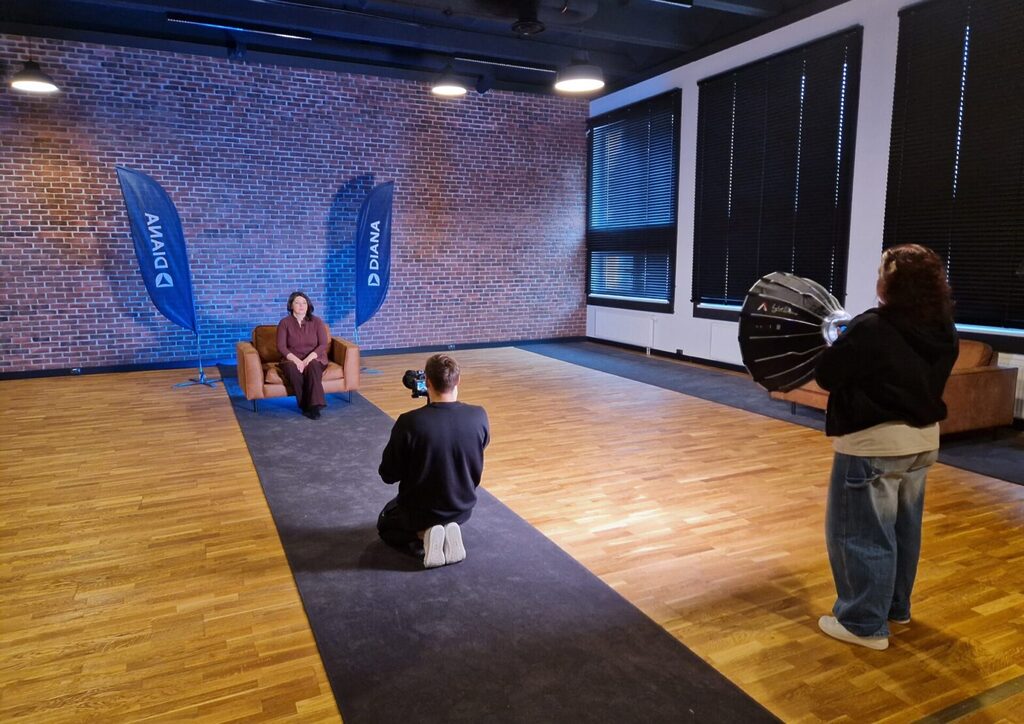
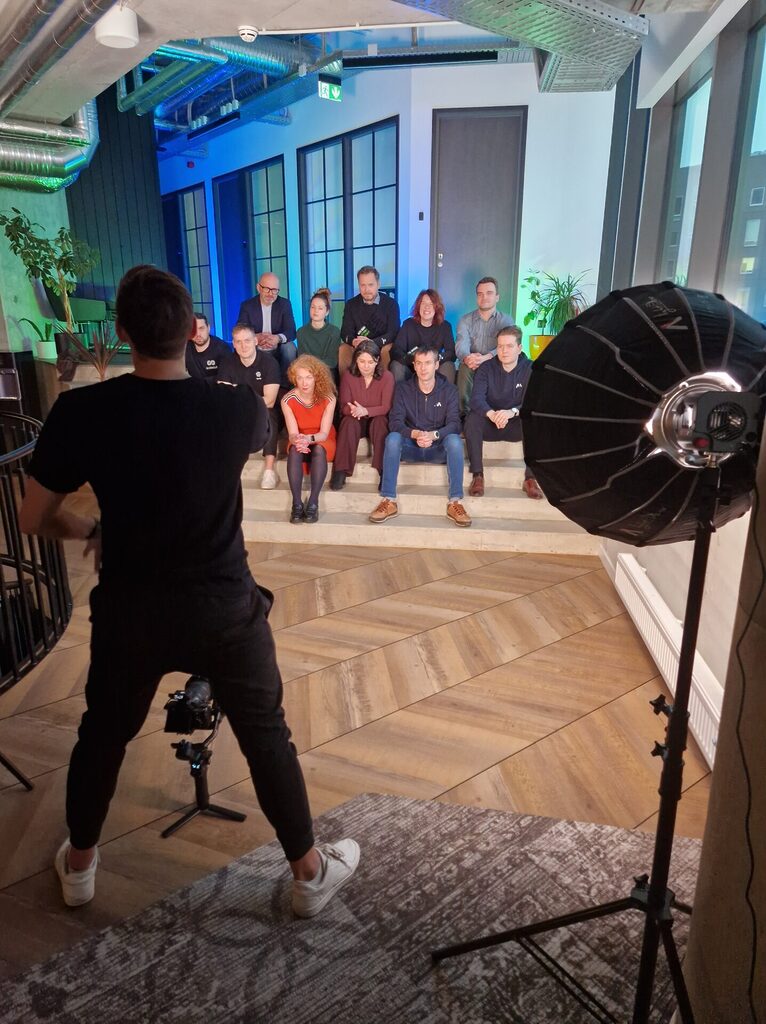
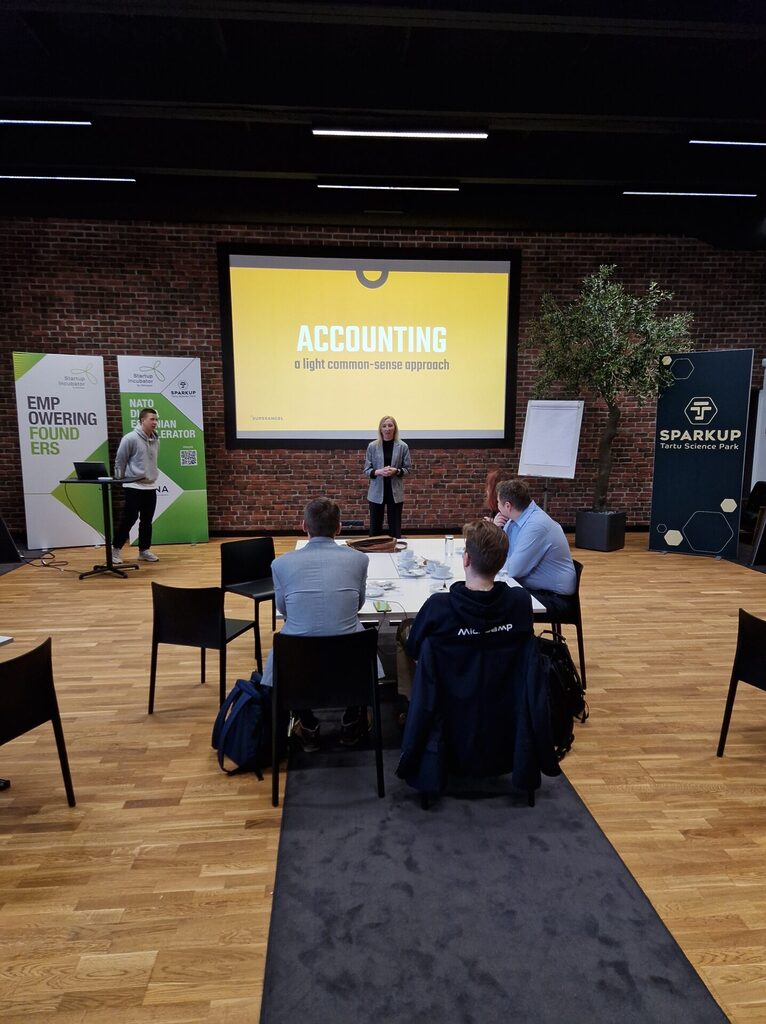
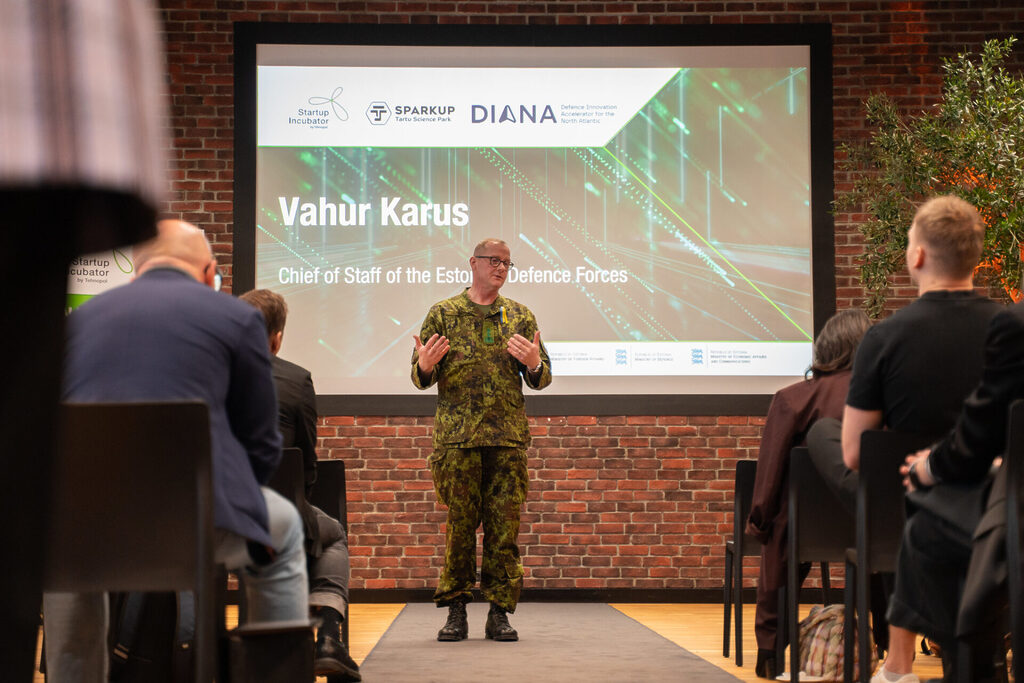
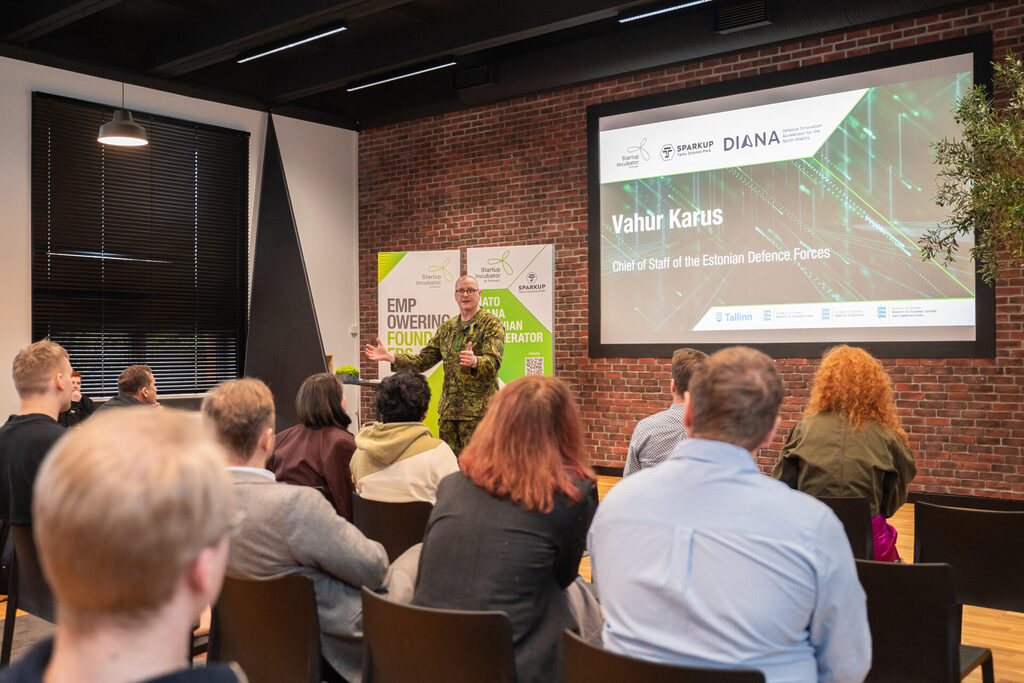
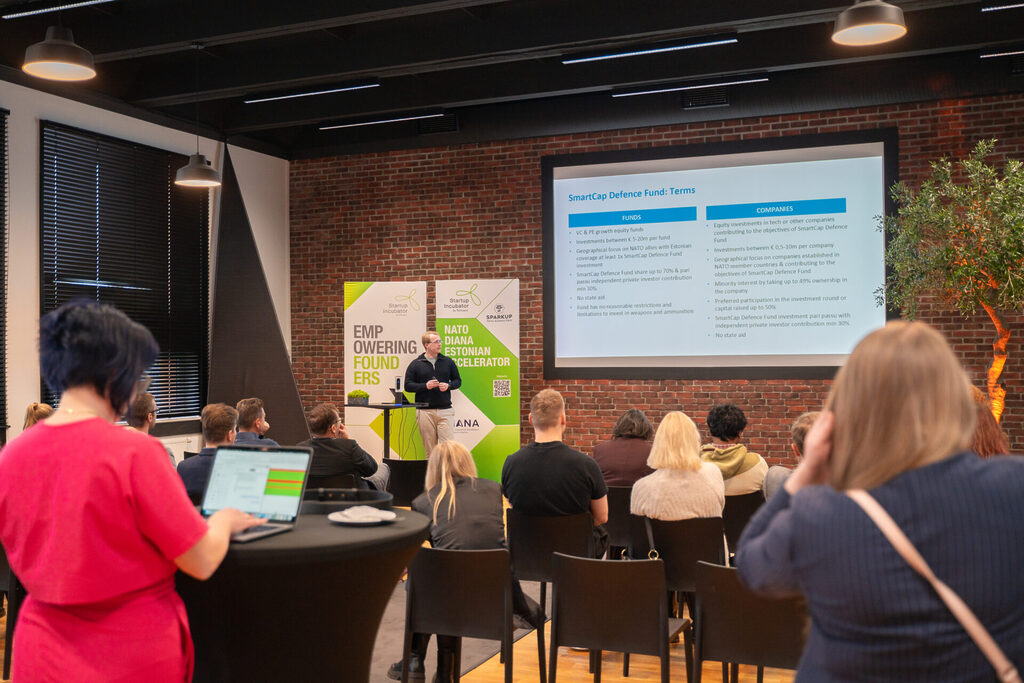
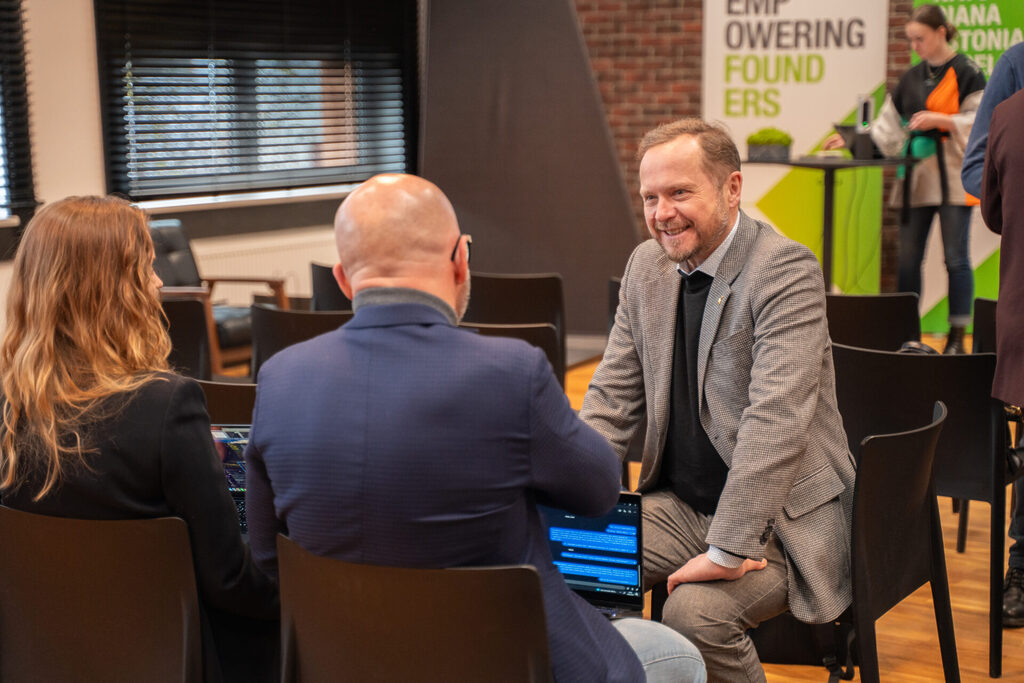
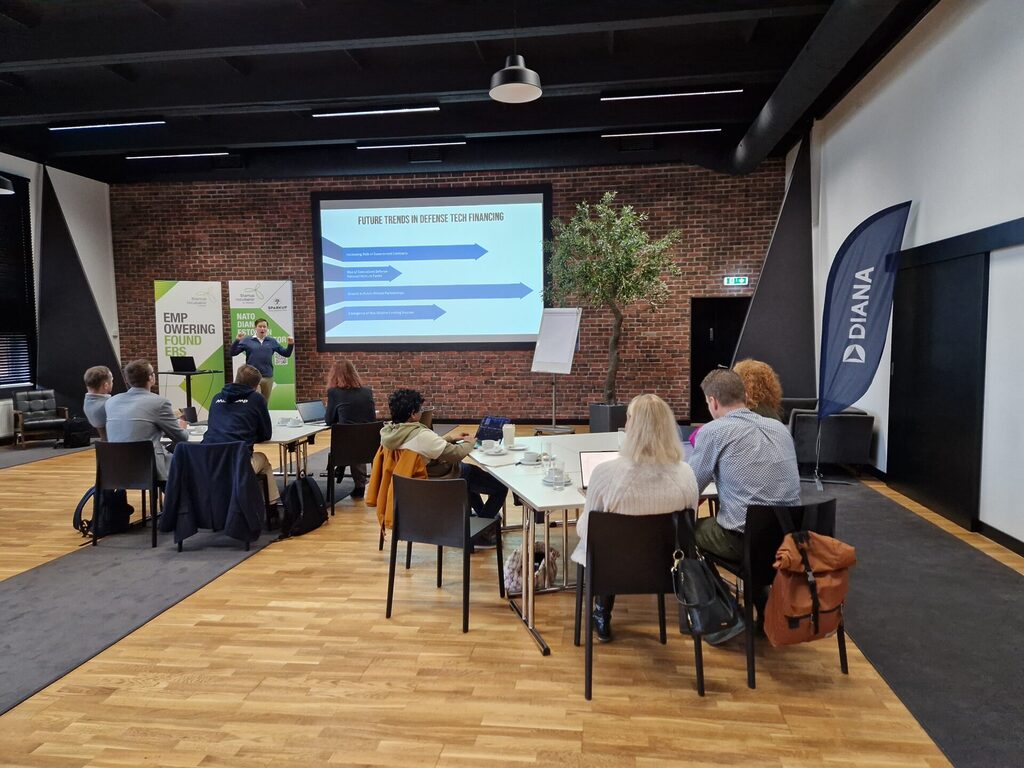
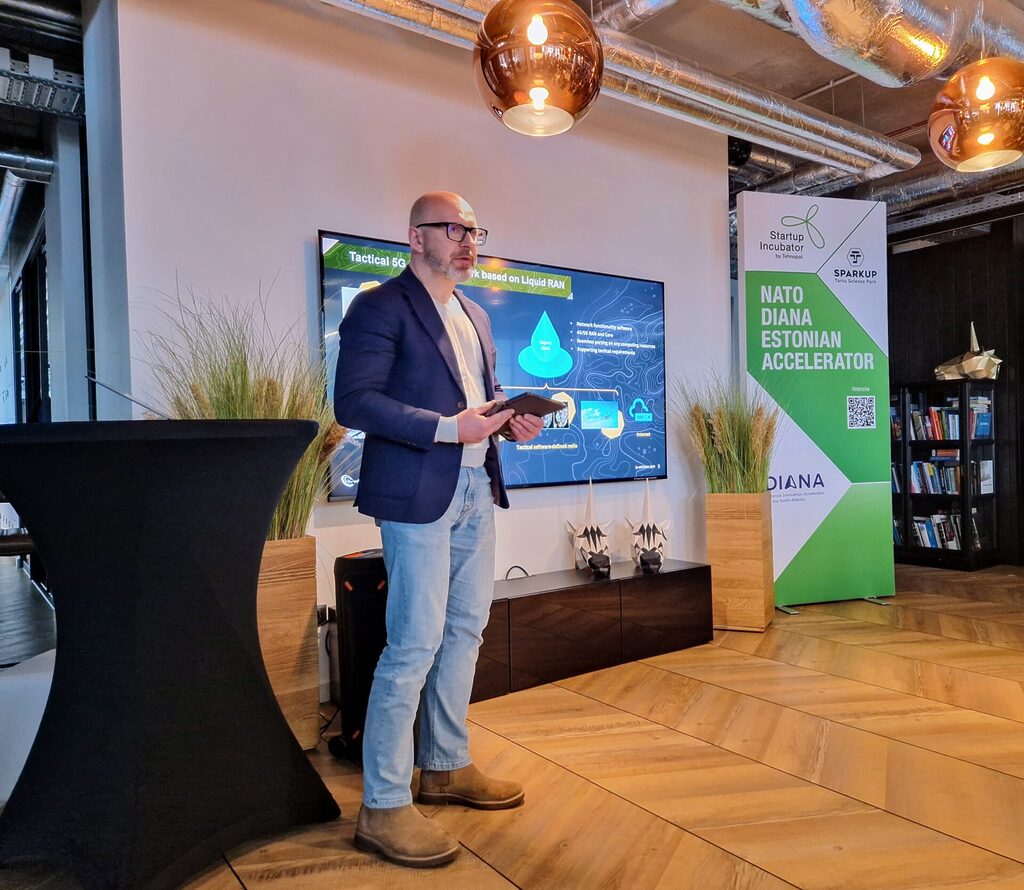
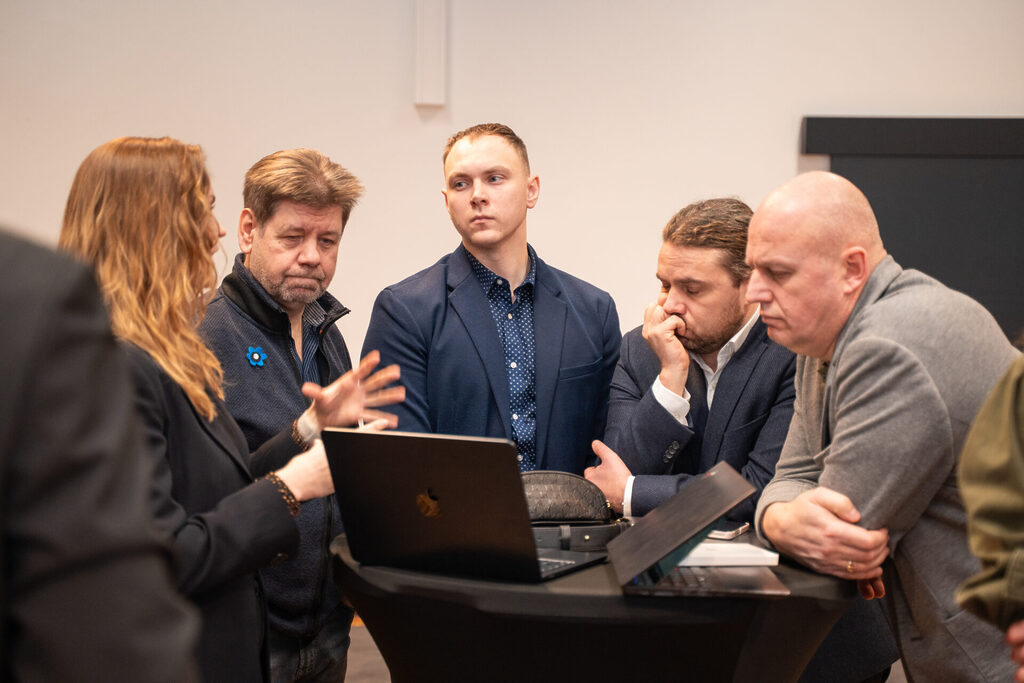
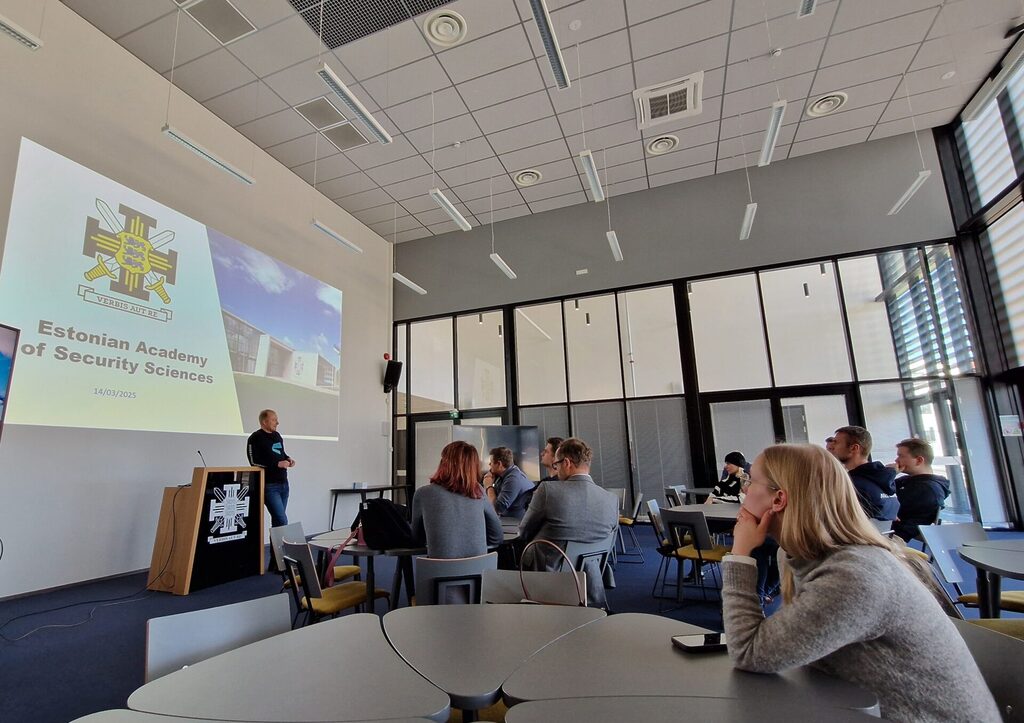
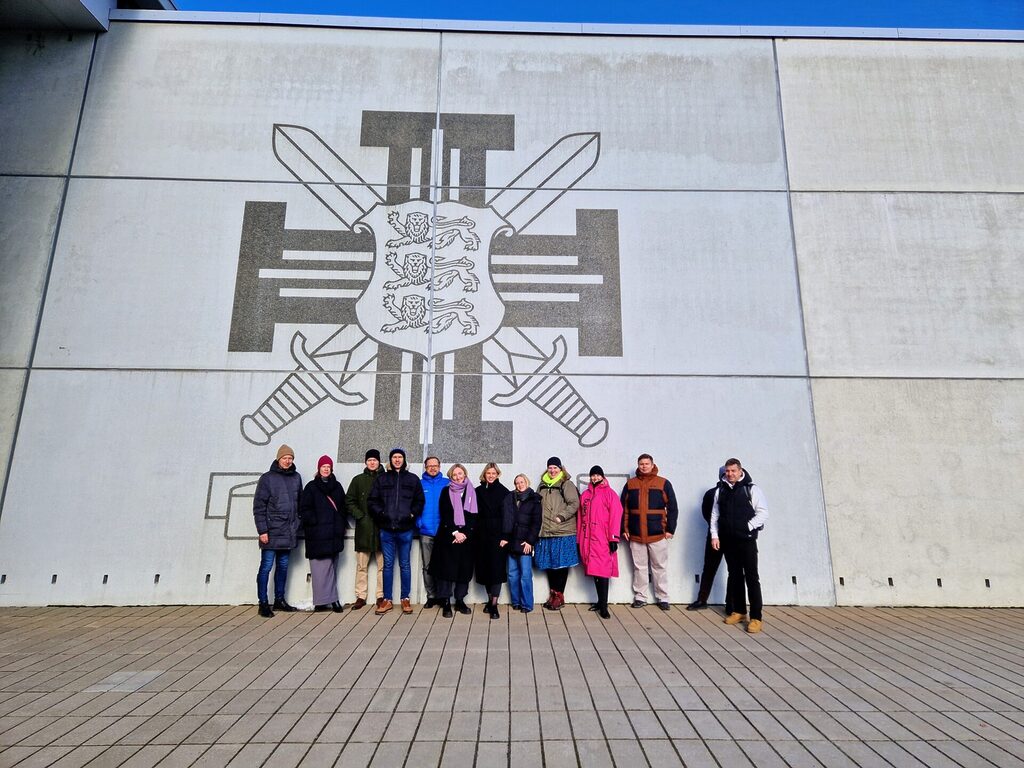
NATO DIANA Accelerator alumni GaltTec secures €1M to power drones and IoT devices with next-generation fuel cells
GaltTec, an Estonian deep-tech startup developing micro-tubular solid oxide fuel cells (mSOFCs) for portable and off-grid energy solutions, has successfully closed its pre-seed funding round, raising a total of €1 million from private investors and grants. The investment will accelerate the company’s mission to provide lightweight, long-lasting power solutions for drones and IoT devices, reducing reliance on conventional batteries. GaltTec was the only Estonian startup in the NATO DIANA Accelerator’s first batch.
The investment round was led by 2C Ventures, a cleantech focused venture capital fund committed to advancing climate-neutral economy. The Fund seeks to back exceptional science based start-ups developing transformative technologies and is managed by Martin Koppel, Taavi Veskimägi, Herty Tammo and Hendrik Reimand. The round was also joined by various well-known angel investors and entrepreneurs, including Kuldar Väärsi, along with Bitsick OÜ and ModulEnergy OÜ, further strengthening GaltTec’s network of strategic backers.
Private investment complements public grant funding from the Estonian Business and Innovation Agency, the European Space Agency Business Incubation Center, the Estonian Ministry of Defense, the State Shared Service Centre, and the NATO DIANA Accelerator program.
Founded in 2022, GaltTec is pioneering fuel cell technology to meet the growing demand for lightweight, sustainable, and highly efficient energy solutions. The company’s fuel cells are designed to significantly extend operational endurance for drones and IoT devices, making them a game-changer for industries that rely on long-lasting, portable power sources.
“This investment allows us to accelerate the development of our next-generation fuel cell technology, bringing us closer to delivering lightweight, high-efficiency power solutions for drones and off-grid devices,” said Glen Kelp, CEO and Co-Founder of GaltTec.
GaltTec already partners with leading drone manufacturers, including Skycorp Technologies, a European pioneer in hydrogen-powered drones, showcasing the real-world potential of its technology.
“GaltTec’s fuel cell technology has the potential to redefine how we power drones and IoT devices, offering a sustainable alternative to traditional batteries and fossil fuels,” said Martin Koppel, Partner at 2C Ventures. “We believe their innovation is a game-changer for cleantech and energy resilience, and we’re excited to support their journey as they scale and expand into global markets.”
GaltTec’s dual-use strategy positions its fuel cells as a critical solution for both commercial and defense sectors. In 2024, the company became the first Estonian startup to join the NATO DIANA accelerator program, which supports deep-tech companies contributing to national security and defense. The accelerator in Estonia is led by the Tehnopol Startup Incubator together with the Sparkup Tartu Science Park.
Additionally, GaltTec has signed a cooperation agreement with the Estonian Defence Forces to test ethanol-based fuel cells, further reinforcing the strategic importance of its technology.
With strong backing from both private and public sectors, GaltTec is well-positioned to scale its technology, expand into new markets, and drive the future of sustainable energy solutions for drones, IoT devices, and beyond.
On the photo: GaltTec co-founders Laura Elise Arvisto, Glen Kelp, Tanel Tätte (photo taken by Paul Meiesaar)
Estonia is to host a defence industry themed event Estonian Defence Week
Estonian Defence and Aerospace Industry Association (EKTL) in cooperation with the Ministry of Defence, is organizing the first-ever Estonian Defence Week in September, bringing together domestic and international defence industry companies, investors, specialists, and policymakers. The week begins with an event organized by the NATO DIANA Estonian accelerator.
Estonian Defence Week will take place from 22 to 26 September at both Tallinn’s Kultuurikatel Creative Hub and Tartu Ülenurme Airport. For the first time in Estonia, this large-scale themed event will introduce Estonian and regional defence industry companies, their products, and developing technologies over five days. The focus will be on fostering cooperation, establishing investor relations, and hosting discussions on defence industry and security policy with both domestic and international experts.
“The Estonian defence industry has firmly proven itself – several of our companies daily contribute to winning the war on the frontlines in Ukraine, and innovative solutions developed in Estonia are gaining increasing interest from Australia to America. Therefore, it is important that Estonia hosts its own major defence industry event, just as is customary elsewhere in the world,” said EKTL’s CEO Kalev Koidumäe. “The goal of Estonian Defence Week is to consolidate all events related to Estonia’s defence and security sector into one week and, in collaboration with the Ministry of Defence, establish it as an annual meeting place for entrepreneurs, investors, and opinion leaders shaping defence industry policy.”
“While Estonian entrepreneurs have so far attended various fairs around the world, if we are serious about developing the defence industry, it is critically important that we are also able to introduce defence industry products in Estonia. This event will bring together suppliers and purchasers, as well as, for example, those who wish to invest in the Estonian defence industry,” said Minister of Defence Hanno Pevkur. “It is an opportunity for us as a country to demonstrate what we can offer to the defence sector.”
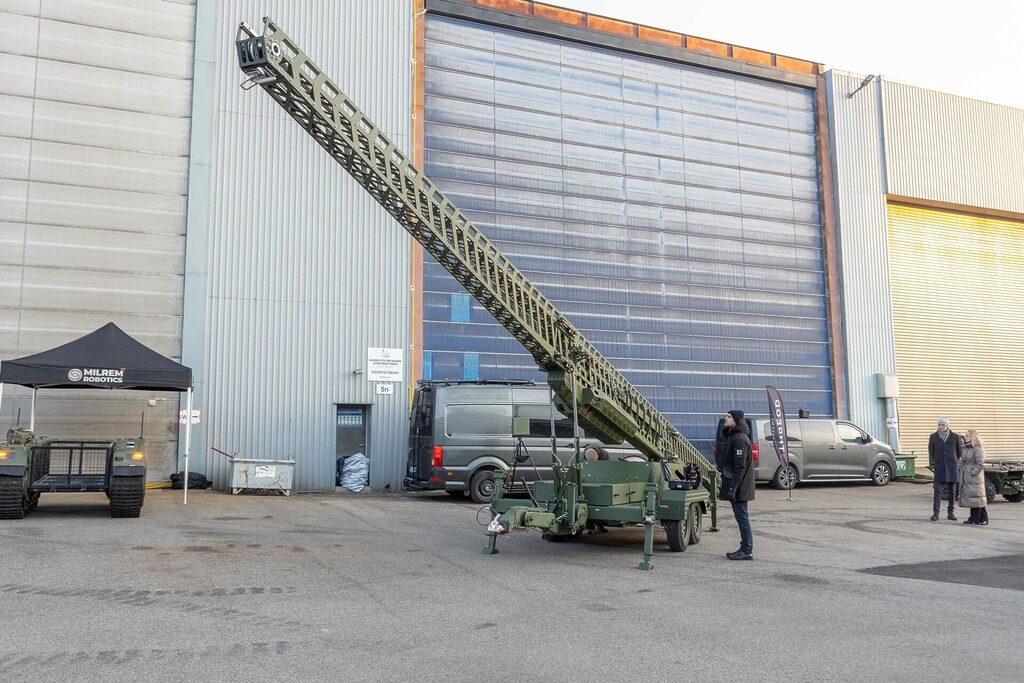
Estonian Defence Week will begin with a day dedicated to startups in the security and defence sector, organized by the Tehnopol Startup Incubator’s NATO DIANA Estonian accelerator (Defence Innovation Accelerator for the North Atlantic).
The programme will also feature the annual Baltic Defence Conference ABCD (23–24 September), where over two days politicians, military officials, academics, analysts, and media representatives will discuss NATO and EU defence issues.
The week’s central events will include the Estonian Defence Industry Symposium “The Power of Disruption” (25 September) and “Tallinn Defence EXPO” (24–25 September) at Kultuurikatel, featuring presentations, panel discussions, and working groups on military technologies.
The Defence Week will conclude with a demo day for specialists in Tartu (26 September), showcasing various defence sector technologies.
A more detailed event overview is available here.
Founded in February 2009, the Estonian Defence and Aerospace Industry Association (EKTL) currently brings together over 150 companies covering all key defence industry sectors. The association aims to create better opportunities for its member companies in developing and marketing defence technologies and to serve as a strategic partner to the Estonian state in strengthening national defence as well as contributing to economic growth.
Photos by Kaarel Tigas from the Estonian defence industry demo day held for foreign journalists during the Joint Expeditionary Force Summit in Tallinn in December last year.
Accelerating to the international stage with the support of accelerators
Estonian defence technology startup Wayren is making strides in secure communication solutions. The company, which raised €725,000 in its first funding round last year, has also received support from the European Defence Fund and the Estonian Ministry of Defence. However, beyond financial backing, Wayren’s journey has been shaped by various accelerators that have helped refine its technology and business model. How have these programs influenced their growth, and where is the company headed next? We spoke with Wayren’s co-founder and CEO, Henry Härm, to find out.
Wayren essentially started from the Estonian Defence Forces. What was the trigger to launch a startup?
“We worked together with the co-founders in the Cyber Command of the Estonian Defence Forces, developing a battle management system, and we saw that making quick decisions and improving systems were hindered by the reliability of communication. We wanted to digitalize the battlefield, so that’s how Wayren got started. Our first funding came from the Ministry of Defence’s defence industry support fund, which confirmed to us that this solution was necessary and already believed in from the early stages.”
Receiving funding from Prototron is an important milestone for many startups, as it provides not only financial support but also increased visibility. What were the most valuable resources Prototron provided for you?
“From Prototron, we received €20,000 in funding, which allowed us to assemble our first physical product kit and send it to customers for testing. After Prototron, we sent our product to Ukraine for testing to get feedback directly from the battlefield.”
After Prototron, you moved on to the Tehnopol Startup Incubator. How did the Startup Incubator impact the development of your platform?
“The incubator primarily provided general support for developing our startup through training, and having a key mentor was also crucial. Our key mentor was Pirko Konsa. During that period, we had to put in a lot of effort ourselves and develop our skills to overcome key milestones with the company. The incubator served as a support structure that helped us reach our goals. We also benefited from Tehnopol’s international network of professionals to further develop our business model.”
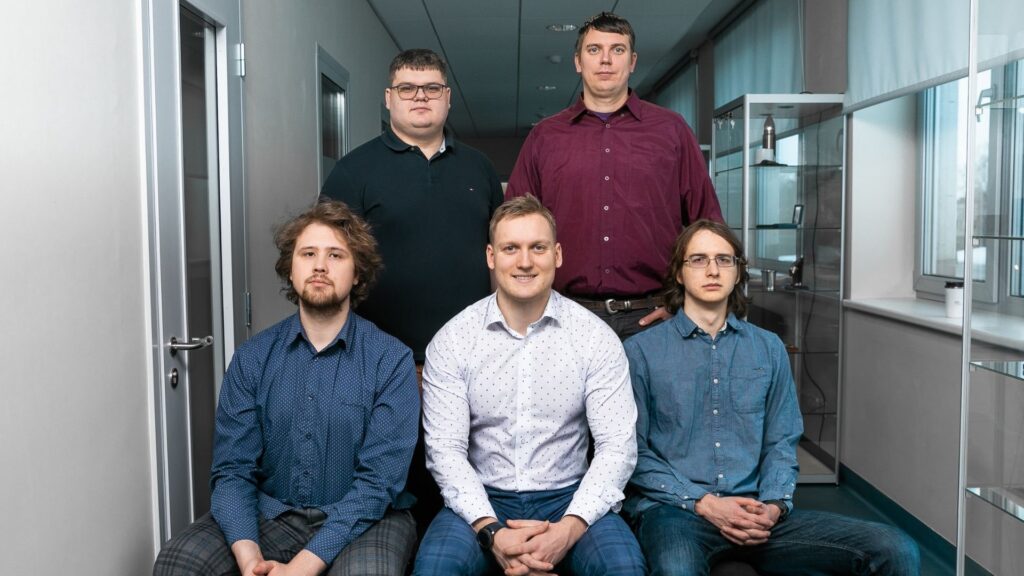
Wayren was one of the companies selected for the second cohort of the NATO DIANA accelerator in Estonia at the end of last year. There were about 2,500 applications from across the alliance. What are your expectations for this program?
“From NATO DIANA, we primarily expect testing opportunities and networking with potential partners and end-users. We hope that participating in this accelerator will serve as a mark of trust and quality, help establish Wayren in the defence industry, and connect us with potential partners.”
You also applied to NATO DIANA last year but were not selected at that time.
“Yes, we had very little time to submit the application, and we were not satisfied with the final version of our submission. This year, we took it seriously, allocated enough time, and prepared a very strong application. For this program, the preparation process is extremely important—it requires companies to think through what they want to achieve and how it aligns with the accelerator’s challenges. This groundwork is crucial.”
Looking back at your journey so far, where do you think Wayren would be now if you hadn’t had the opportunity to participate in different accelerators?
“I believe that various funds and accelerators have accelerated our growth—some learning moments have been easier to go through with the support of accelerators, as mentors and trainers have shared so much of their experience and advice with us. I personally feel that thanks to this support, our company’s development has been a few years faster and possibly also more professional.”
What are Wayren’s short-term goals? How do you plan to further develop your platform to meet both defence and civilian sector needs?
“Our main plan is to offer our technology in the defence industry to both Estonia and our allies. Right now, our focus among allies is on Ukraine. Once that part is covered, our next major step will be to start marketing our technology in the civilian sector. Our initial focus in the civilian sector is on mining—besides projects in Estonia, we want to work on mining digitalization projects abroad in the future. We believe this could be a strong additional growth platform alongside the defence sector. Additionally, we are planning another funding round within the next year.”
And finally—who will be the next Estonian unicorn?
“We will be!”
If your startup is ready to join an accelerator, act now—Tehnopol Startup Incubator is currently accepting applications! More details and application HERE!
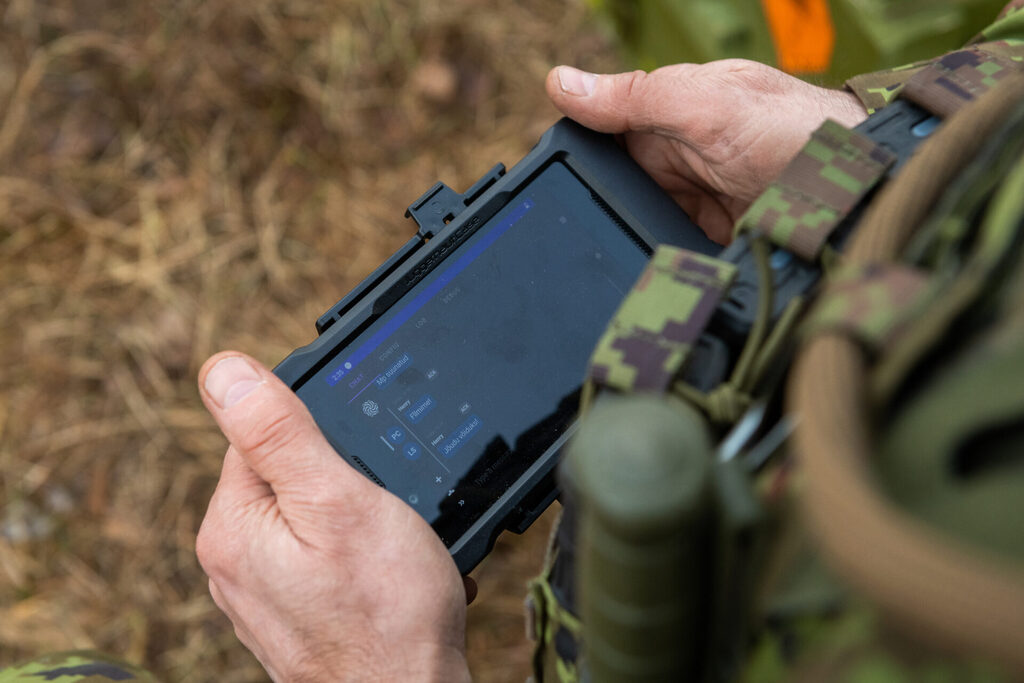
sTARTUp Day is turning 10 next year, and now is the perfect time to grab your super early-bird ticket at the best price! Join us inTartu on January 28–30, 2026, for an unforgettable anniversary edition filled with inspiring speakers, game-changing networking, and next-level opportunities. Get your ticket today and be part of the celebration!
This interview was originally published in sTARTUp Day blog.
Meet Tehnopol at sTARTUp Day: our guide for the event
This week, business festival sTARTUp Day takes place in Tartu, which is always one of the highlights of the year for startups. Tehnopol Science and Business Park will be at the demo area, we have invested our time and energy into several (side) events and the startups of Tehnpol Startup Incubator will take the stage.
If you have a startup and would like to pitch your idea on the sTARTUp Day stage perhaps next year, apply to the Startup Accelerator. We are currently accepting applications from early-stage tech startups. Not sure if you are ready for an Accelerator? Let us help you decide:
🔍 You have validated your idea. Don’t guess—make sure the problem you’re trying to solve actually exists for real users and someone needs it. Talk to potential customers about your idea and find out whether they’d be willing to pay for it.
💪 You have a dream team. If you don’t have a team yet, start building one! Look for potential team members at events and within your network—collaboration brings the best results. By the way, strong teams are also one important factor that the investors look for.
📑 Your paperwork is in order. Start with a private limited company and make sure everything is properly documented. Make agreements within the team on how the company’s ownership will be divided.
🛠️ You have built your MVP. Develop a Minimum Viable Product (MVP) to test the market demand. It’s better to move fast than to aim for perfection—everything doesn’t have to be flawless, but is must be functional.
🎯 You have set goals and are staying focused. Create an action plan and identify the goals you want to achieve. Working towards a shared objective helps to avoid distractions and keeps you focused on what really matters.
🚀 You should apply to the Accelerator! If you have all these points covered, you are more than ready to join the Accelerator! Read more here.
Where to find us at sTARTUp Day
If you want to discuss your ideas with us before sending your application, feel free to find us in Tartu. Here are some hints as to where we’ll be.
We kick off the week in Tartu on January 29 with Zebra ScaleUp Bootcamp Pitching. This is a closed event, only companies that are participating in Zebra ScaleUp project are expected.
The same day, all health tech enthusiasts are welcome at Gutenberg Club to take part in “Entrepreneurs meet researchers—matchmaking for R&D collaboration in health technologies”. If you are interested, see more information and register here.
On January 30 at 15:50, we will gather at the Pitching Stage where Tehnopol Demo Day takes place and our hard-working startups take the stage to pitch their ideas. Come join us and find out what the startups are up to. On the stage: Eetos (Startup Accelerator), Wayren (NATO DIANA Accelerator), GaltTec (NATO DIANA Accelerator), Kindel.AI (Startup Accelerator), GaasAI (Startup Accelerator), TeleArmy (NATO DIANA Accelerator), TraynMe (Startup Accelerator), VisioTag (Film and Multimedia Accelerator), Bebo (Startup Accelerator).
On January 30, Wayren will talk about their experience with different funds and accelerator programs at Starlight Stage. They have received funding from Prototron, attended the Startup Accelerator and last year, Wayren was one of the startups selected from thousands of applicants to the NATO DIANA Estonian Accelerator. So, find “Accelerate or Stagnate: The Role of Growth Programs in Startup Success” from the program and come listen with us.
In addition, here are some additional recommendations:
- January 30 11:00 Prorotron x Swedbank: The Insider’s Guide to Secure Your First Funding (Seminar Room 3)
- January 30 14:45 Prototron Open Mic (Pitching Stage)
Last, but not least—come by our booth at the demo area. You can find out more about our accelerator programs, projects, services for scaleups and simply have a chat with us. And since we still have your attention here, we can reveal a little secret about our booth: You can take photos enhanced by AI as a keepsake from sTARTUp Day 2025!

















